Big Ideas Math Answers Grade 3 Chapter 3 More Multiplication Facts and Strategies: See more ideas on multiplication in Big Ideas Math Book 3rd Grade Answer Key Chapter 3 More Multiplication Facts and Strategies. The students of the 3rd class can get the solutions for all the questions in different methods from Big Ideas Math Answers Chapter 3 More Multiplication Facts and Strategies. We have provided the solutions for all the questions in pdf format. Hence we suggest you download BIM 3rd Grade Answer Key Chapter 3 More Multiplication Facts and Strategies for free.
Big Ideas Math Book 3rd Grade Answer Key Chapter 3 More Multiplication Facts and Strategies
BIM Answer Key for Grade 3 Chapter 3 More Multiplication Facts and Strategies pdf links are available here. The topics covered in More Multiplication Facts and Strategies are multiply by 3, multiply by 4, multiply by 6, multiply by 7, multiply by 8, multiply by 9. In addition to the exercise problems, you can also get the solutions for homework and practice problems. Tap the links to check out the solutions to all the questions from the below section.
Lesson 1 – Multiply by 3
Lesson 2 Multiply by 4
Lesson 3 Multiply by 6
Lesson 4 Multiply by 7
Lesson 5 Multiply by 8
Lesson 6 Multiply by 9
Lesson 7 Practice Multiplication Strategies
- Lesson 3.7 Practice Multiplication Strategies
- Practice Multiplication Strategies Homework & Practice 1.1
Lesson 8 Multiply Three Factors
Lesson 9 More Problem Solving: Multiplication
- Lesson 3.9 More Problem Solving: Multiplication
- More Problem Solving: Multiplication Homework & Practice 3.9
Performance Task
- More Multiplication Facts and Strategies Performance Task
- More Multiplication Facts and Strategies Activity
- More Multiplication Facts and Strategies Chapter Practice
Lesson 3.1 Multiply by 3
Explore and Grow
Use the number line to find the product.
4 × 3 = _____

Answer: 12

Repeated Reasoning
Explain how you can use the number line to find products greater than 20. Complete the table

Answer:

Think and Grow: Multiply by 3
Example
Find 5 × 3.
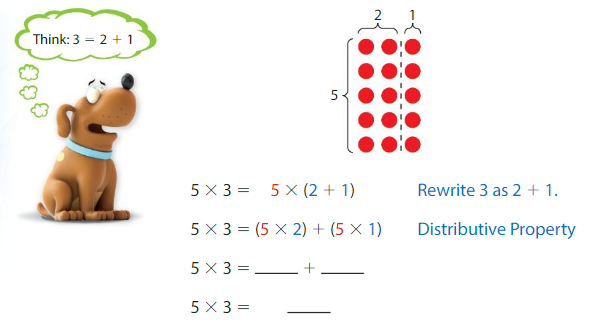
Answer:
Distribute 3 to 2 and 1.
5 × 3 = 5 × (2 + 1)
5 × 3 = (5 × 2) + (5 × 1)
5 × 3 = 10 + 5
5 × 3 = 15
Show and Grow
Find the product
Question 1.
6 × 3
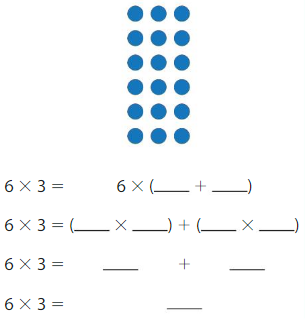
Answer:
Distribute 3 to 2 and 1.
6 × 3 = 6 × (2 + 1)
6 × 3 = (6 × 2) + (6 × 1)
6 × 3 = 12 + 6
6 × 3 = 18
Question 2.
3 × 4
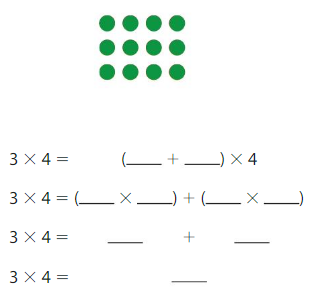
Answer:
Distribute 3 to 2 and 1.
3 × 4 = (2 + 1) × 4
3 × 4 = (2 × 4) + (1 × 4)
3 × 4 = 8 + 4
3 × 4 = 12
2 × 3
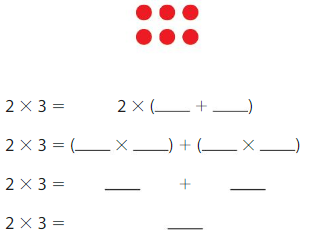
Answer:
Distribute 3 to 2 and 1.
2 × 3 = 2 × (2 + 1)
2 × 3 = (2 × 2) + (2 × 1)
2 × 3 = 4 + 2
2 × 3 = 6
Question 4.
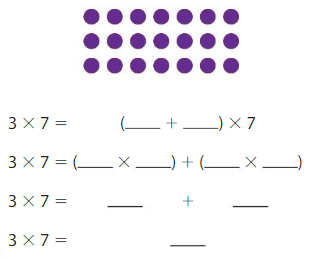
Answer:
Distribute 3 to 2 and 1.
3 × 7 = (2 + 1) × 7
3 × 7 = (2 × 7) + (1 × 7)
3 × 7 = 14 + 7
3 × 7 = 21
Question 5.
3 × 8 = ____
Answer:
Distribute 3 to 2 and 1.
3 × 8 = (2 + 1) × 8
3 × 8 = (2 × 8) + (1 × 8)
3 × 8 = 16 + 8
3 × 8 = 24
Question 6.
3 × 1 = ____
Answer:
Distribute 3 to 2 and 1.
3 × 1 = (2 + 1) × 1
3 × 1 = (2 × 1) + (1 × 1)
3 × 1 = 2 + 1
3 × 1 = 3
Question 7.
3 × 3 = _____
Answer:
Distribute 3 to 2 and 1.
3 × 3 = (2 + 1) × 3
3 × 3 = (2 × 3) + (1 × 3)
3 × 3 = 6 + 3
3 × 3 = 9
Question 8.
3 × 5 = _____
Answer:
Distribute 3 to 2 and 1.
3 × 5 = (2 + 1) × 5
3 × 5 = (2 × 5) + (1 × 5)
3 × 5 = 10 + 5
3 × 5 = 15
Question 9.

Answer:
Multiply the two numbers 3 and 6.
3 × 6 = 18
Question 10.

Answer:
Multiply the two numbers 3 and 10.
Multiply 3 by 0 and 3 by 1
10 × 3 = 30
Question 11.

Answer:
Multiply the two numbers 3 and 4.
4 × 3 = 12
Question 12.

Answer:
Multiply the two numbers 3 and 9.
3 × 9 =27
Compare
Question 13.
![]()
Answer: >
Explanation:
8 × 3 = 24
3 × 6 = 18
24 is greater than 18
Thus 8 × 3 > 3 × 6
Question 14.

Answer: <
Explanation:
3 × 1 = 3
3 × 10 = 30
3 is less than 30.
3 × 1 < 3 × 10
Question 15.

Answer: =
Explanation:
Any number multiplied by 0 will be always 0.
3 × 0 = 0
0 × 3 = 0
Thus 3 × 0 = 0 × 3
Question 16.
A baseball game has 9 innings. Each team gets 3 outs every inning. How many outs does each team get in one game?
Answer:
Given that,
A baseball game has 9 innings. Each team gets 3 outs every inning.
9 × 3 = 27
Therefore each team gets 27 outs in one game.
Question 17.
YOU BE THE TEACHER
Your friend says 23 is a multiple of 3 because there is a 3 in the ones place. Is your friend correct? Explain.
Answer:
Given,
Your friend says 23 is a multiple of 3 because there is a 3 in the ones place.
No, my friend is not correct. Because 23 is a prime number it is not a multiple of 3.
Think and Grow: Modeling Real Life
Ten people want toride a camel. There are 3 camels. Twopeople can ride on each camel. Are there enough camels for all of the people to ride at the same time?
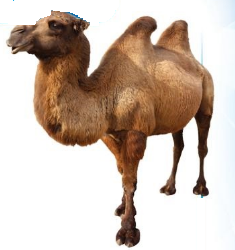
Multiplication equation:
There _____ enough camels for all of the people.
Answer:
Given,
Ten people want to ride a camel. There are 3 camels. Two people can ride on each camel.
3 × 2 = 6
There are not enough camels for all the 10 people.
Show and Grow
Question 18.
You want to give each of your 10 friends a sticker. You buy 4 sheets. Each sheet has 3 stickers. Do you have enough stickers?
Answer:
Given,
You want to give each of your 10 friends a sticker. You buy 4 sheets. Each sheet has 3 stickers.
1 sheet – 3 stickers
4 sheets – 4 × 3 stickers = 12 stickers
12 – 10 = 2 stickers
Yes, I have enough stickers.
Question 19.
DIG DEEPER!
You buy 2 heads of cauliflower and 5 ears of corn. How much money do you spend?
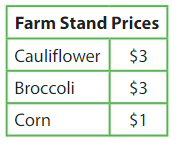
You buy 3 heads of broccoli and 1 head of cauliflower.How much money do you spend?
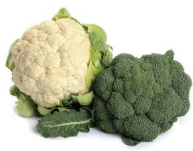
Answer:
The cost of 1 Broccoli is $3
The cost of 1 Cauliflower is $3
3 broccoli = 3 × $3 = $9
1 cauliflower = 1 × $3 = $3
9 + 3 = $12
Therefore I spent $12.
Multiply by 3 Homework & Practice 3.1
Find the product
Question 1.
3 × 3
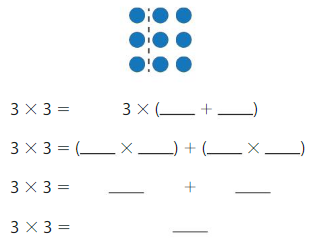
Answer:
Distribute 3 to 2 and 1.
3 × 3 = 3 × (2 + 1)
3 × 3 = (3 × 2) + (3 × 1)
3 × 3 = 6 + 3
3 × 3 = 9
Question 2.
3 × 9
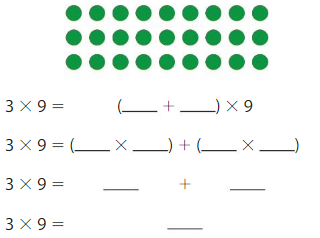
Answer:
Distribute 3 to 2 and 1.
3 × 9 = (2 + 1) × 9
3 × 9 = (2 × 9) + (1 × 9)
3 × 9 = 18 + 9
3 × 9 = 27
Question 3.
3 × 2 = ___
Answer:
Distribute 3 to 2 and 1.
3 × 2 = (2 + 1) × 2
3 × 2 = (2 × 2) + (1 × 2)
3 × 2 = 4 + 2
3 × 2 = 6
Question 4.
3 × 5 = ____
Answer:
Distribute 3 to 2 and 1.
3 × 5 = (2 + 1) × 5
3 × 5 = (2 × 5) + (1 × 5)
3 × 5 = 10 + 5
3 × 5 = 15
Question 5.
7 × 3 = _____
Answer:
Distribute 3 to 2 and 1.
7 × 3 = 7 × (2 + 1)
7 × 3 = (7 × 2) + (7 × 1)
7 × 3 = 14 + 7
7 × 3 = 21
Question 6.
0 × 3 = ____
Answer:
Any number multiplied by 0 will be always 0.
0 × 3 = 0
Question 7.

Answer:
Multiply the two numbers 3 and 4.
3 × 4 = 12
Question 8.

Answer:
multiply the two numbers 3 and 10.
3 × 10 = 30
Question 9.

Answer:
Multiply the two numbers 6 and 3.
6 × 3 = 18
Question 10.

Answer:
Multiply the two numbers 3 and 1.
3 × 1 = 3
Compare
Question 11.
![]()
Answer: <
Explanation:
0 × 3 = 0
3 × 3 = 9
0 is less than 9.
0 × 3 < 3 × 3
Question 12.
![]()
Answer: >
Explanation:
8 × 3 = 24
7 × 3 = 21
24 > 21
8 × 3 > 7 × 3
Question 13.

Answer: =
Explanation:
6 × 3 = 18
18 = 18
Question 14.
A Russian guitar, called a , has 3 strings. A music teacher is replacing the strings on 5 balalaikas. How many strings does the teacher need?
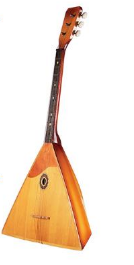
Answer:
Given that,
A Russian guitar, called a, has 3 strings. A music teacher is replacing the strings on 5 balalaikas.
3 × 5 = 15
Thus the teacher needs 15 strings.
Question 15.
Number Sense
Circle the multiples of 3.
![]()
Answer: The multiples of 3 are 12, 15, 21.
Question 16.
Modeling Real Life
You need 24 tennis balls. You buy 6 packs of 3 tennis balls. Do you have enough tennis balls?
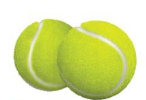
Answer:
Given,
You need 24 tennis balls. You buy 6 packs of 3 tennis balls.
6 × 3 = 18
24 – 18 = 6 tennis balls
Thus I don’t have enough tennis balls.
Question 17.
DIG DEEPER!
Newton buys 3 packs of plates and 3 packs of cups. How much money does he spend?
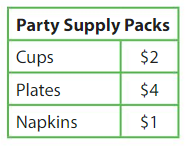
Answer:
Given,
Newton buys 3 packs of plates and 3 packs of cups.
Cost of 1 plate = $4
Cost of 1 cup = $2
3 plates = 3 × $4 = $12
3 cups = 3 × $2 = $6
12 + 6 = 18
Thus Newton spend $18.
Review & Refresh
Question 18.
Which shapes show thirds?

Answer: The 2nd, 3rd, and 4th figures show thirds. Because the figures are divided into 3 parts.
Lesson 3.2 Multiply by 4
Explore and Grow
Use the tape diagram to find the product
3 × 4 = _____

Answer:

Repeated Reasoning
Explain how you can use a tape diagram to find the missing products in the table. Complete the table.

Answer:

Think and Grow: Multiply by 4
Example
Find 5 × 4.
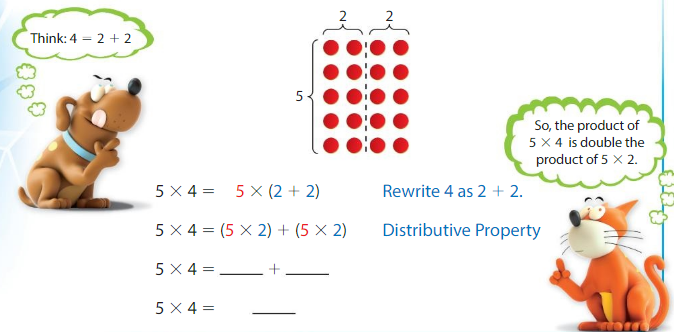
Answer:
Rewrite 4 as 2 + 2.
5 × 4 = 5 × (2 + 2)
5 × 4 = (5 × 2) + (5 × 2)
5 × 4 = 10 + 10
5 × 4 = 20
Show and Grow
Find the product
Question 1.
6 × 4
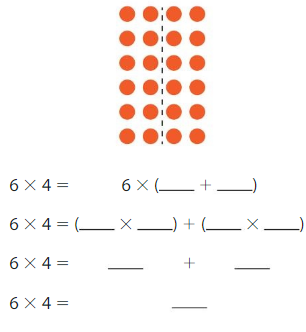
Answer:
Rewrite 4 as 2 + 2.
6 × 4 = 6 × (2 + 2)
6 × 4 = (6 × 2) + (6 × 2)
6 × 4 = 12 + 12
6 × 4 = 24
Question 2.
4 × 8
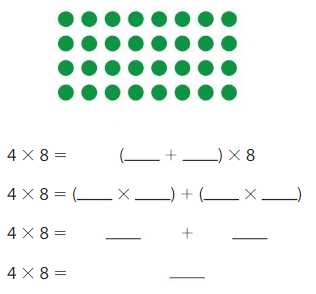
Answer:
Rewrite 4 as 2 + 2.
4 × 8 = (2 + 2) × 8
4 × 8 = (2 × 8) + (2 × 8)
4 × 8 = 16 + 16
4 × 8 = 32
Apply and Grow:Practice
Find the product
Question 3.
4 × 4
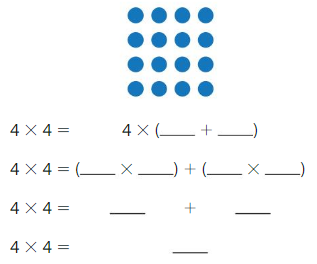
Answer:
Rewrite 4 as 2 + 2.
4 × 4 = 4 × (2 + 2)
4 × 4 = (4 × 2) + (4 × 2)
4 × 4 = 8 + 8
4 × 4 = 16
Question 4.
4 × 2
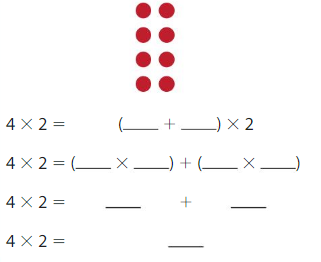
Answer:
Rewrite 4 as 2 + 2.
4 × 2 = (2 + 2) × 2
4 × 2 = (2 × 2) + (2 × 2)
4 × 2 = 4 + 4
4 × 2 = 8
Question 5.
4 × 5 = ___
Answer:
Rewrite 4 as 2 + 2.
4 × 5 = (2 + 2) × 5
4 × 5 = (2 × 5) + (2 × 5)
4 × 5 = 10 + 10
4 × 5 = 20
Question 6.
4 × 7 = ___
Answer:
Rewrite 4 as 2 + 2.
4 × 7 = (2 + 2) × 7
4 × 7 = (2 × 7) + (2 × 7)
4 × 7 = 14 + 14
4 × 7 = 28
Question 7.
4 × 6 = ____
Answer:
Rewrite 4 as 2 + 2.
4 × 6 = (2 + 2) × 6
4 × 6 = (2 × 6) + (2 × 6)
4 × 6 = 12 + 12
4 × 6 = 24
Question 8.
4 × 1 = ____
Answer:
Rewrite 4 as 2 + 2.
4 × 1 = (2 + 2) × 1
4 × 1 = (2 × 1) + (2 × 1)
4 × 1 = 2 + 2
4 × 1 = 4
Question 9.

Answer:
Rewrite 4 as 2 + 2.
10 × 4 = 10 × (2 + 2)
10 × 4 = (10 × 2) + (10 × 2)
10 × 4 = 20 + 20
10 × 4 = 40
Question 10.

Answer:
Rewrite 4 as 2 + 2.
3 × 4 = 3 × (2 + 2)
3 × 4 = (3 × 2) + (3 × 2)
3 × 4 = 6 + 6
3 × 4 = 12
Question 11.

Answer:
Rewrite 4 as 2 + 2.
8 × 4 = 8 × (2 + 2)
8 × 4 = (8 × 2) + (8 × 2)
8 × 4 = 16 + 16
8 × 4 = 32
Question 12.

Answer:
Rewrite 4 as 2 + 2.
4 × 9 = (2 + 2) × 9
4 × 9 = (2 × 9) + (2 × 9)
4 × 9 = 18 + 18
4 × 9 = 36
Find the missing factor.
Question 13.
4 × ___ = 0
Answer: 0
Explanation:
Let the missing factor be x.
4 × x = 0
x = 0/4
x = 0
Thus the missing factor is 0.
Question 14.
___ × 4 = 40
Answer: 10
Explanation:
Let the missing factor be y.
y × 4 = 40
y = 40/4
y = 10
Thus the missing factor is 10.
Question 15.
4 = ____ × 4
Answer:
Let the missing factor be t.
4 = t × 4
t = 4/4
t = 1
Thus the missing factor is 1.
Question 16.
Number Sense
You exchange some dollar bills for quarters. How many quarters might you receive?

Answer:
Convert from dollars to quarters
1 dollar = 4 quarters
Multiples of 4 are 12, 16, 24, 36, 40.
Question 17.
Explain how you can use 2 × 3 to find 4 × 3.
Answer:
Rewrite 4 as 2 + 2.
4 × 3 = (2 + 2) × 3
4 × 3 = (2 × 3) + (2 × 3)
4 × 3 = 6 + 6
4 × 3 = 12
Think and Grow: Modeling Real Life
The graph shows the number of cars scheduled to get a new set of tires installed. How many new tires are installed on the busiest day?
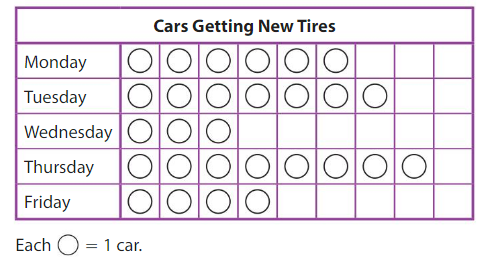
What is the busiest day?
Multiplication equation:
______ new tires are installed on the busiest day.
Answer:
Monday = 6 × 1 = 6 new tires
Tuesday = 7 × 1 = 7 new tires
Wednesday = 3 × 1 = 3 new tires
Thursday = 8 × 1 = 8 new tires
Friday = 4 × 1 = 4 new tires
8 new tires are installed on the busiest day.
Show and Grow
Question 18.
Use the graph above. How many new tires are installed on the least busy day?
Answer:
Monday = 6 × 1 = 6 new tires
Tuesday = 7 × 1 = 7 new tires
Wednesday = 3 × 1 = 3 new tires
Thursday = 8 × 1 = 8 new tires
Friday = 4 × 1 = 4 new tires
3 new tires are installed on the least busy day.
Question 19.
DIGD EEPER!
Descartes is packing bags for party favors. Each bag needs 1 container of bubbles, 5 stickers, and 3 balloons. How many of each item does Descartes need to make 4 bags?
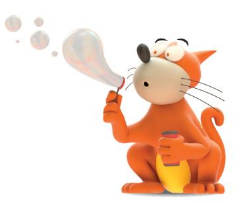
Answer:
Given that,
Descartes is packing bags for party favors.
Each bag needs 1 container of bubbles, 5 stickers, and 3 balloons.
4 bags = 1 bubble × 4 + 5 stickers × 4 + 3 balloons × 4
4 bags = 4 + 20 + 12 = 36
Thus Descartes need 4 bubbles, 20 stickers and 12 balloons.
Multiply by 4 Homework & Practice 3.2
Fing the product
Question 1.
3 × 4
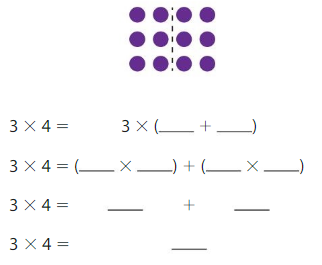
Answer:
Rewrite 4 as 2 + 2.
3 × 4 = 3 × (2 + 2)
3 × 4 = (3 × 2) + (3 × 2)
3 × 4 = 6 + 6
3 × 4 = 12
Question 2.
4 × 9
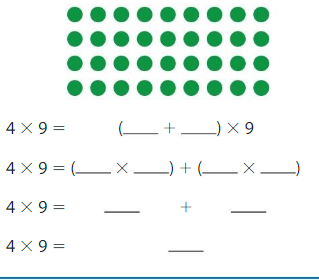
Answer:
Rewrite 4 as 2 + 2.
4 × 9 = (2 + 2) × 9
4 × 9 = (2 × 9) + (2 × 9)
4 × 9 = 18 + 18
4 × 9 = 36
Question 3.
8 × 4 = ___
Answer:
Rewrite 4 as 2 + 2.
8 × 4 = 8 × (2 + 2)
8 × 4 = (8 × 2) + (8 × 2)
8 × 4 = 16 + 16
8 × 4 = 32
Question 4.
4 × 4 = ____
Answer:
Rewrite 4 as 2 + 2.
4 × 4 = 4 × (2 + 2)
4 × 4 = (4 × 2) + (4 × 2)
4 × 4 = 8 + 8
4 × 4 = 16
Question 5.
10 × 4 = _____
Answer:
Rewrite 4 as 2 + 2.
10 × 4 = 10 × (2 + 2)
10 × 4 = (10 × 2) + (10 × 2)
10 × 4 = 20 + 20
10 × 4 = 40
Question 6.
4 × 6 = _____
Answer:
Rewrite 4 as 2 + 2.
4 × 6 = (2 + 2) × 6
4 × 6 = (2 × 6) + (2 × 6)
4 × 6 = 12 + 12
4 × 6 = 24
Question 7.

Answer:
Rewrite 4 as 2 + 2.
4 × 5 = (2 + 2) × 5
4 × 5 = (2 × 5) + (2 × 5)
4 × 5 = 10 + 10
4 × 5 = 20
Question 8.

Answer:
Any number multiplied by 0 is always 0.
0 × 4 = 0
Question 9.

Answer:
Any number multiplied by 1 is always the same number.
1 × 4 = 4
Question 10.

Answer:
Rewrite 4 as 2 + 2.
2 × 4 = 2 × (2 + 2)
2 × 4 = (2 × 2) + (2 × 2)
2 × 4 = 4 + 4
2 × 4 = 8
Find the missing factor
Question 11.
10 × ____ = 40
Answer: 4
Explanation:
Let the missing factor be p.
10 × p = 40
p = 40/10 = 4
p = 4
Therefore the missing factor is 4.
Question 12.
____ × 1 = 4
Answer: 4
Explanation:
Let the missing factor be q.
q × 1 = 4
q = 4/1
q = 4
Therefore the missing factor is 4.
Question 13.
8 = ____ × 4
Answer: 2
Explanation:
Let the missing factor be r.
8 = r × 4
r = 8/4
r = 2
Therefore the missing factor is 2.
Question 14.
A string quartet has 4 musicians. Each musician’s instrument has 4 strings. How many total strings are there in a string quartet?
Answer: 16
Explanation:
Given that,
A string quartet has 4 musicians. Each musician’s instrument has 4 strings.
1 musician = 4 strings
4 musicians = 4 × 4 strings = 16 strings
Therefore there are 16 strings in a string quartet.
Question 15.
Which One Doesn’tBelong?
Which one does belong with the other three?

Answer:
(2 × 3) + (2 × 3) doesn’t belong to the other three expressions.
4 × 6, 6 × 4, (2 × 6) + (2 × 6) belong to other expressions. Because
4 × 6 = 24
6 × 4 = 24
(2 × 6) + (2 × 6) = 12 + 12 = 24
Question 16.
Modeling Real Life
The tally chart shows the number of tables a carpenter makes each day. Each table has 4 legs. How many legs does the carpenter make on the busiest day?
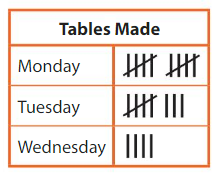
Answer:
Given,
The tally chart shows the number of tables a carpenter makes each day. Each table has 4 legs.
Monday – 5 + 5 = 10
Tuesday – 5 + 3 = 8
Wednesday – 4
Monday – 10 × 4 = 40
Tuesday – 8 × 4 = 32
Wednesday – 4 × 4 = 16
Thus the carpenter makes 40 legs on the busiest day.
Question 17.
DIG DEEPER!
Newton is packing lunches. Each lunch needs 1 sandwich, 2 celery sticks, 3 carrot sticks, and 4 strawberries. How many of each item does Newton need to make 4 lunches?
Answer:
Given,
Newton is packing lunches. Each lunch needs 1 sandwich, 2 celery sticks, 3 carrot sticks, and 4 strawberries.
1 lunch – 1 sandwich, 2 celery sticks, 3 carrot sticks, 4 strawberries
4 lunches – 1 sandwich × 4, 2 celery sticks × 4, 3 carrot sticks × 4, 4 strawberries × 4 = 4 + 8 + 12 + 16 = 40
Thus newton needs 4 sandwiches, 8 celery sticks, 12 carrot sticks, and 16 strawberries to make 4 lunches.
Review & Refresh
Write the number in expanded form and word form
Question 18.
837
____ + ____ + _____
_______________
Answer:
The expanded form of 837 is 800 + 30 + 7
The word form of 837 is Eight Hundred and Third Seven.
Question 19.
954
____ + ____ + ____
_______________
Answer:
The expanded form of 954 is 900 + 50 + 4
The word form of 954 is Nine Hundred and Fifty-Four.
Lesson 3.3 Multiply by 6
Explore and Grow
Question 1.
Use equal groups to find the product. Draw your model.
4 × 6 = _____
Answer:

6 + 6 + 6 + 6 = 24
Repeated Reasoning
Explain how you can use equal groups to multiply. Complete the table.

Answer:

Think and Grow: Multiply by 6
Example
Find 5 × 6.
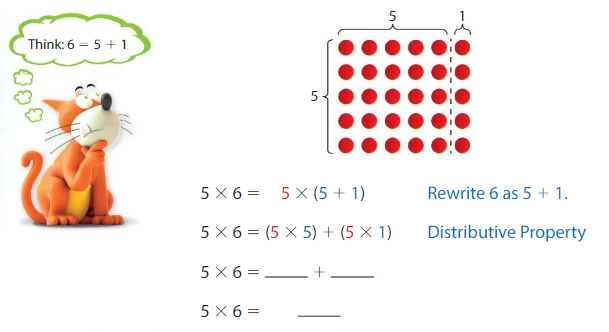
Answer:
Rewrite 6 as 5 + 1.
5 × 6 = 5 × (5 + 1)
5 × 6 = (5 × 5) + (5 × 1)
5 × 6 = 25 + 5
5 × 6 = 30
Show and Grow
Find the product
Question 1.
3 × 6
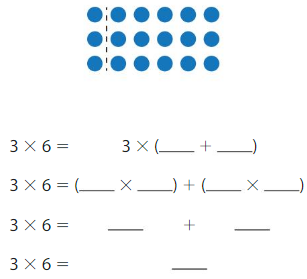
Answer:
Distribute 6 as 3 + 3.
3 × 6 = 3 × (3 + 3)
3 × 6 = (3 × 3) + (3 × 3)
3 × 6 = 9 + 9
3 × 6 = 18
Question 2.
6 × 5
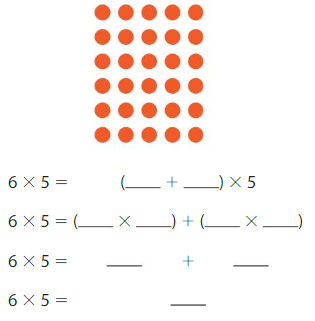
Answer:
Distribute 6 as 3 + 3.
6 × 5 = (3 + 3) × 5
6 × 5 = (3 × 5) + (3 × 5)
6 × 5 = 15 + 15
6 × 5 = 30
Apply and Grow: Practice
Find the product
Question 3.
6 × 7
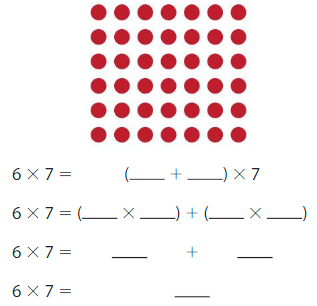
Answer:
Distribute 6 as 3 + 3.
6 × 7 = (3 + 3) × 7
6 × 7 = (3 × 7) + (3 × 7)
6 × 7 = 21 + 21
6 × 7 = 42
Question 4.
4 × 6
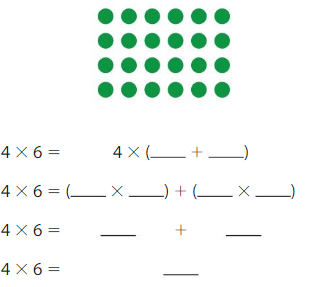
Answer:
Distribute 6 as 3 + 3.
4 × 6 = 4 × (3 + 3)
4 × 6 = (4 × 3) + (4 × 3)
4 × 6 = 12 + 12
4 × 6 = 24
Question 5.
8 × 6 = ___
Answer:
Distribute 6 as 3 + 3.
8 × 6 = 8 × (3 + 3)
8 × 6 = (8 × 3) + (8 × 3)
8 × 6 = 24 + 24
8 × 6 = 48
Question 6.
7 × 6 = ____
Answer:
Distribute 6 as 3 + 3.
7 × 6 = 7 × (3 + 3)
7 × 6 = (7 × 3) + (7 × 3)
7 × 6 = 21 + 21
7 × 6 = 42
Question 7.
6 × 0 = ___
Answer: 0
Any number multiplied by 0 will be always 0.
6 × 0 = 0
Question 8.
6 × 4 = ____
Answer:
Distribute 6 as 3 + 3.
6 × 4 = (3 + 3) × 4
6 × 4 = (3 × 4) + (3 × 4)
6 × 4 = 12 + 12
6 × 4 = 24
Question 9.

Answer:
Distribute 6 as 3 + 3.
6 × 6 = 6 × (3 + 3)
6 × 6 = (6 × 3) + (6 × 3)
6 × 6 = 18 + 18
6 × 6 = 36
Question 10.

Answer: 6
Distribute 6 as 3 + 3.
6 × 1 = (3 + 3) × 1
6 × 1 = (3 × 1) + (3 × 1)
6 × 1 = 3 + 3
6 × 1 = 6
Question 11.

Answer: 12
Distribute 6 as 3 + 3.
2 × 6 = 2 × (3 + 3)
2 × 6 = (2 × 3) + (2 × 3)
2 × 6 = 6 + 6
2 × 6 = 12
Question 12.

Answer: 54
Distribute 6 as 3 + 3.
9 × 6 = 9 × (3 + 3)
9 × 6 = (9 × 3) + (9 × 3)
9 × 6 = 27 + 27
9 × 6 = 54
Compare
Question 13.

Answer: =
Explanation:
8 × 6 = 48
48 = 48
Question 14.

Answer: <
Explanation:
6 × 0 = 0
10 × 6 = 60
6 × 0 < 10 × 6
Question 15.
![]()
Answer: <
Explanation:
6 × 1 = 6
6 × 3 = 18
6 is less than 18.
6 × 1 < 6 × 3
Question 16.
There are 9 volleyball teams in a tournament. There are 6 players on each team. How many volleyball players are in the tournament?
Answer: 54
Explanation:
Given,
There are 9 volleyball teams in a tournament. There are 6 players on each team.
9 × 6 = 54
Thus there are 54 volleyball players in the tournament.
Question 17.
YOU BE THE TEACHER
Your friend says that all multiples of 3 are also multiples of 6. Is your friend correct? Explain.
Answer: No. Multiples of 3 are not the multiples of 6.
Think and Grow: Modeling Real Life
You have 5 apples. You cut each apple into8 slices. You have6 oranges and cut each orange into4 slices. Do you have more apple slices or orange slices?
Multiplication equations:
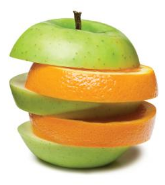

You have more _____ slices.
Answer:
Given,
You have 5 apples. You cut each apple into 8 slices. You have 6 oranges and cut each orange into 4 slices.
1 apple = 8 slices
5 apples = 5 × 8 slices = 40 slices
1 orange = 4 slices
6 oranges = 6 × 4 slices = 24 slices
40 slices is greater than 24 slices.
Therefore you have more apple slices.
Show and Grow
Question 18.
Your friend makes 6 bracelets each day for 7 days. Your cousin makes 10 bracelets each day for 3 days. Who makes fewer bracelets?
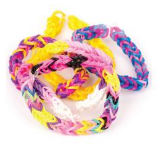
Answer:
Given,
Your friend makes 6 bracelets each day for 7 days.
Your cousin makes 10 bracelets each day for 3 days.
1 day = 6 bracelets
7 days = 7 × 6 bracelets = 42 bracelets
1 day = 10 bracelets
3 days = 3 × 10 bracelets = 30 bracelets
By this we can say that my cousin makes fewer bracelets.
Question 19.
You draw 6 octagons. How many sides do you draw?
Answer: A octagon contains 8 sides. Thus I need to draw 48 sides for all 6 octagon.
Question 20.
You draw 9 hexagons. How many sides do you draw?
Answer: A hexagon contains 6 sides. Thus I need to draw 54 sides for all 9 hexagons.
Multiply by 6 Homework & Practice 3.3
Find the product
Question 1.
2 × 6
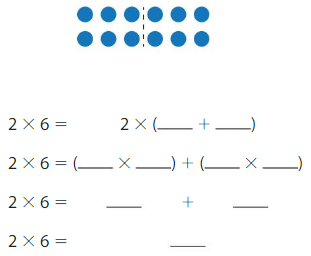
Answer:
Distribute 6 as 3 + 3.
2 × 6 = 2 × (3 + 3)
2 × 6 = (2 × 3) + (2 × 3)
2 × 6 = 6 + 6
2 × 6 = 12
Question 2.
6 × 6
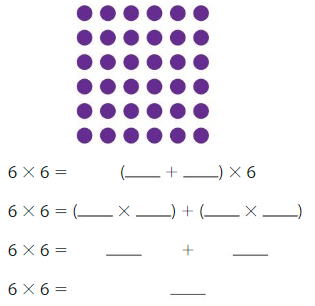
Answer:
Distribute 6 as 3 + 3.
6 × 6 = (3 + 3) × 6
6 × 6 = (3 × 6) + (3 × 6)
6 × 6 = 18 + 18
6 × 6 = 36
Question 3.
9 × 6 = ____
Answer:
Distribute 6 as 3 + 3.
9 × 6 = 9 × (3 + 3)
9 × 6 = (9 × 3) + (9 × 3)
9 × 6 = 27 + 27
9 × 6 = 54
Question 4.
5 × 6 = _____
Answer:
Distribute 6 as 3 + 3.
5 × 6 = 5 × (3 + 3)
5 × 6 = (5 × 3) + (5 × 3)
5 × 6 = 15 + 15
5 × 6 = 30
Question 5.
6 × 3 = ____
Answer:
Distribute 6 as 3 + 3.
6 × 3 = (3 + 3) × 3
6 × 3 = (3 × 3) + (3 × 3)
6 × 3 = 9 + 9
6 × 3 = 18
Question 6.
4 × 6 = ____
Answer:
Distribute 6 as 3 + 3.
4 × 6 = 4 × (3 + 3)
4 × 6 = (4 × 3) + (4 × 3)
4 × 6 = 12 + 12
4 × 6 = 24
Question 7.

Answer:
Distribute 6 as 3 + 3.
8 × 6 = 8 × (3 + 3)
8 × 6 = (8 × 3) + (8 × 3)
8 × 6 = 24 + 24
8 × 6 = 48
Question 8.

Answer:
Any number multiplied by 0 is always 0.
So, 6 × 0 = 0
Question 9.

Answer:
Any number multiplied by 1 is always the same number.
6 × 1 = 6
Question 10.

Answer:
Distribute 6 as 3 + 3.
10 × 6 = 10 × (3 + 3)
10 × 6 = (10 × 3) + (10 × 3)
10 × 6 = 30 + 30
10 × 6 = 60
Compare
Question 11.
![]()
Answer: <
Explanation:
4 × 6 = 24
6 × 6 = 36
24 < 36
Thus 4 × 6 < 6 × 6
Question 12.

Answer: >
Explanation:
6 × 5 = 30
4 × 5 = 20
30 > 20
Thus 6 × 5 > 4 × 5
Question 13.
![]()
Answer: =
Explanation:
6 × 7 = 42
42 = 42
Thus 42 = 6 × 7
Question 14.
There are 6 faces on a standard die. How many faces are on 5 dice?
Answer: 30 faces
Explanation:
Given that,
There are 6 faces on a standard die.
1 dice – 6 faces
5 dice – 5 × 6 faces = 30 faces
Thus 5 dice has 30 faces.
Question 15.
DIG DEEPER!
You have a muffin tin with 6 cups. You want to bake 36 muffins. How many times must you use the muffin tin?
Answer:
Given,
You have a muffin tin with 6 cups. You want to bake 36 muffins.
1 muffin tin – 6 cups
x – 36 muffins
36/6 = 6
Thus I must use 6 muffin tins.
Question 16.
Modeling Real Life
You practice the saxophone 1 hour in the morning and 2 hours at night each day. How many hours do you practice in 6 days?
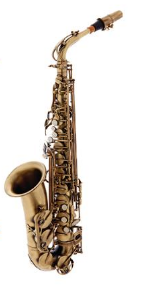
Answer:
Given that,
You practice the saxophone for 1 hour in the morning and 2 hours at night each day.
1 day = 1 + 2 = 3 hours
6 days = 6 × 3 = 18 hours.
Thus you practice 18 hours in 6 days.
Question 17.
Modeling Real Life You want to make 6 pentagons using toothpicks. How many toothpicks do you need?
Answer:
We know that a pentagon contains 5 sides.
So to make the pentagon you need 5 toothpicks
6 pentagons = 6 × 5 = 30 toothpicks.
Thus you need 30 toothpicks to make 6 pentagons.
Review & Refresh
Question 18.
Find the total value.

Total value: _____
Answer:
2 dimes = $0.2
2 pennies = $0.02
1 Nickel = $0.05
1 Washington quarter = $0.25
1 cent = $0.01
Total Value = $0.2+ $0.02 + $0.05 + $0.25 + $0.01
= $0.53
Thus the total value is $0.53
Lesson 3.4 Multiply by 7
Explore and Grow
Question 1.
Use the number line to find the product
2 × 7 = ____

Answer:
![]()
Multiply 2 and 7.
7 + 7 = 14
Repeated Reasoning
Complete the table. Explain how you found the missing products.

Answer:

Think and Grow: Multiply by 7
Example
Find 3 × 7
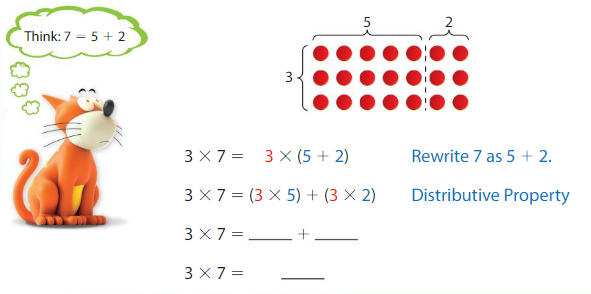
Answer:
Rewrite 7 as 5 + 2.
Use Distributive Property.
3 × 7 = 3 × (5 + 2)
3 × 7 = (3 × 5) + (3 × 2)
3 × 7 = 15 + 6
3 × 7 = 21
Show and Grow
Find the product
Question 1.
4 × 7

Answer:
Rewrite 7 as 5 + 2.
Use Distributive Property.
4 × 7 = 4 × (5 + 2)
4 × 7 = (4 × 5) + (4 × 2)
4 × 7 = 20 + 8
4 × 7 = 28
Question 2.
7 × 9

Answer:
Rewrite 7 as 5 + 2.
Use Distributive Property.
7 × 9 = (5 + 2) × 9
7 × 9 = (5 × 9) + (2 × 9)
7 × 9 = 45 + 18
7 × 9 = 63
Apply and Grow: Practice
Find the product
Question 3.
7 × 7
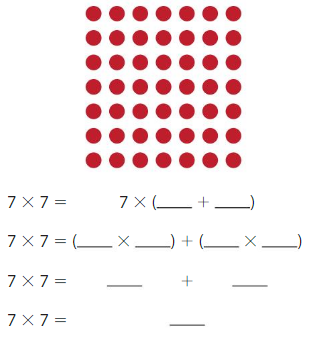
Answer:
Rewrite 7 as 5 + 2.
Use Distributive Property.
7 × 7 = 7 × (5 + 2)
7 × 7 = (7 × 5) + (7 × 2)
7 × 7 = 35 + 14
7 × 7 = 49
Question 4.
7 × 6
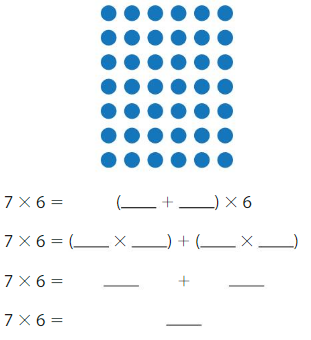
Answer:
Rewrite 7 as 5 + 2.
Use Distributive Property.
7 × 6 = (5 + 2) × 6
7 × 6 = (5 × 6) + (2 × 6)
7 × 6 = 30 + 12
7 × 6 = 42
Question 5.
7 × 5 = ___
Answer:
Rewrite 7 as 5 + 2.
Use Distributive Property.
7 × 5 = (5 + 2) × 5
7 × 5 = (5 × 5) + (2 × 5)
7 × 5 = 25 + 10
7 × 5 = 35
Question 6.
7 × 1 = ___
Answer:
Rewrite 7 as 5 + 2.
Use Distributive Property.
7 × 1 = (5 + 2) × 1
7 × 1 = (5 × 2) + (2 × 1)
7 × 1 = 10 + 2
7 × 1 = 12
Question 7.
2 × 7 = ___
Answer:
Rewrite 7 as 5 + 2.
Use Distributive Property.
2 × 7 = 2 × (5 + 2)
2 × 7 = (2 × 5) + (2 × 2)
2 × 7 = 10 + 4
2 × 7 = 14
Question 8.
3 × 7 = ____
Answer:
Rewrite 7 as 5 + 2.
Use Distributive Property.
3 × 7 = 3 × (5 + 2)
3 × 7 = (3 × 5) + (3 × 2)
3 × 7 = 15 + 6
3 × 7 = 21
Question 9.

Answer:
Rewrite 7 as 5 + 2.
Use Distributive Property.
10 × 7 = 10 × (5 + 2)
10 × 7 = (10 × 5) + (10 × 2)
10 × 7 = 50 + 20
10 × 7 = 70
Question 10.

Answer: 0
Any number multiplied by 0 is always 0.
Question 11.

Answer:
Rewrite 7 as 5 + 2.
Use Distributive Property.
8 × 7 = 8 × (5 + 2)
8 × 7 = (8 × 5) + (8 × 2)
8 × 7 = 40 + 16
8 × 7 = 56
Question 12.

Answer:
Rewrite 7 as 5 + 2.
Use Distributive Property.
7 × 9 = (5 + 2) × 9
7 × 9 = (5 × 9) + (2 × 9)
7 × 9 = 45 + 18
7 × 9 = 63
Find the missing factor
Question 13.
7 × ___ = 0
Answer: 0
Explanation:
Let the missing factor be x.
7 × x = 0
x = 0/7
x = 0
Thus the missing factor is 0.
Question 14.
___ × 7 = 35
Answer: 5
Explanation:
Let the missing factor be y.
y × 7 = 35
y = 35/7
y = 5
Thus the missing factor is 5.
Question 15.
70 = ___ × 7
Answer: 10
Explanation:
Let the missing factor be z.
70 = z × 7
z = 70/7
z = 10
Thus the missing factor is 10.
Question 16.
How many days are in 4 weeks?
Answer: 28 days
Explanation:
Convert from weeks to days.
1 week – 7 days
4 weeks – 4 × 7 = 28 days
Therefore there are 28 days in 4 weeks.
Question 17.
Number Sense
How can you use the Commutative Property of Multiplication to find 7 × 3?
Answer:
The commutative property is a math rule that says that the order in which we multiply numbers does not change the product.
The Commutative Property of Multiplication of 7 × 3 is 3 × 7.
Think and Grow: Modeling Real Life
A child ticket costs $7. An adult ticket costs 4 times as much as the child ticket. Descartes has $40. Can he buy an adult ticket?
Multiplication equation:
Descartes _____ buy an adult ticket.
Answer:
Given,
A child ticket costs $7.
An adult ticket costs 4 times as much as the child ticket.
4 × $7 = $28
Descartes has $40.
$40 – $28 = $12
Therefore Descartes can buy an adult ticket.
Show and Grow
Question 18.
A small painting costs $5. A large painting costs 7 times as much as the small painting. Newton has $30.Can he buy a large painting?

Answer:
Given,
A small painting costs $5.
A large painting costs 7 times as much as a small painting.
7 × $5 = $35
Newton has $30.
$30 – $35 = -$5
Thus he cannot buy a large painting.
Question 19.
DIG DEEPER!
You study your spelling words for 5 minutes twice a day. How many minutes do you spend studying your spelling words in one week?
Answer:
Given,
You study your spelling words for 5 minutes twice a day.
1 day – 2 × 5 = 10 minutes
Convert from week to days.
1 week – 7 days
7 × 10 = 70 minutes
Question 20.
DIG DEEPER!
Your dentist tells you to brush your teeth for 3 minutes three times a day. How many minutes should you spend brushing your teeth in one week?
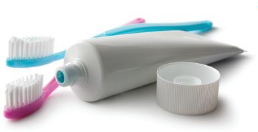
Answer:
Given,
Your dentist tells you to brush your teeth for 3 minutes three times a day.
3 minutes – 3 × 3 = 9 minutes a day.
Convert from week to day.
1 week – 7 days
7 × 9 minutes = 63 minutes a week.
Multiply by 7 Homework & Practice 3.4
Question 1.
5 × 7 =
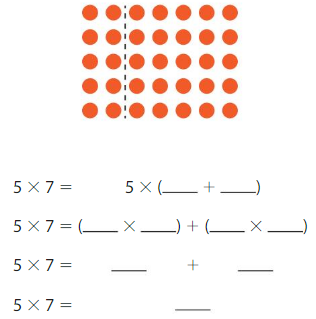
Answer: 35
Explanation:
Rewrite 7 as 2 + 5.
5 × 7 = 5 × (2 + 5)
5 × 7 = (5 × 2) + (5 × 5)
5 × 7 = 10 + 25
5 × 7 = 35
Question 2.
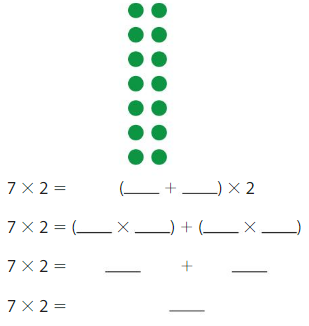
Answer: 14
Explanation:
Rewrite 7 as 2 + 5.
7 × 2 = (2 + 5) × 2
7 × 2 = (2 × 2) + (5 × 2)
7 × 2 = 4 + 10
7 × 2 = 14
Question 3.
0 × 7 = ___
Answer: 0
Explanation: Any number multiplied by 0 will be always 0.
Question 4.
7 × 7 = ____
Answer: 49
Explanation:
Rewrite 7 as 2 + 5.
7 × 7 = (2 + 5) × 7
7 × 7 = (2 × 7) + (5 × 7)
7 × 7 = 14 + 35
7 × 7 = 49
Question 5.
10 × 7 = ____
Answer: 70
Explanation:
Rewrite 7 as 2 + 5.
10 × 7 = 10 × (2 + 5)
10 × 7 = (10 × 2) + (10 × 5)
10 × 7 = 20 + 50
10 × 7 = 70
Question 6.
8 × 7 = ____
Answer: 56
Explanation:
Rewrite 7 as 2 + 5.
8 × 7 = 8 × (2 + 5)
8 × 7 = (8 × 2) + (8 × 5)
8 × 7 = 16 + 40
8 × 7 = 56
Question 7.

Answer: 7
Explanation:
Rewrite 7 as 2 + 5.
7 × 1 = (2 + 5) × 1
7 × 1 = (2 × 1) + (5 × 1)
7 × 1 = 2 + 5
7 × 1 = 7
Question 8.

Answer: 63
Explanation:
Rewrite 7 as 2 + 5.
7 × 9 = (2 + 5) × 9
7 × 9 = (2 × 9) + (5 × 9)
7 × 9 = 18 + 45
7 × 9 = 63
Question 9.

Answer: 28
Explanation:
Rewrite 7 as 2 + 5.
4 × 7 = 4 × (2 + 5)
4 × 7 = (4 × 2) + (4 × 5)
4 × 7 = 8 + 20
4 × 7 = 28
Question 10.

Answer: 21
Explanation:
Rewrite 7 as 2 + 5.
3 × 7 = 3 × (2 + 5)
3 × 7 = (3 × 2) + (3 × 5)
3 × 7 = 6 + 15
3 × 7 = 21
Find the missing factor
Question 11.
7 × ____ = 7
Answer: 1
Explanation:
Let the missing factor be x.
7 × x = 7
x = 7/7
x = 1
Thus the missing factor is 1.
Question 12.
____ × 7 = 14
Answer: 2
Explanation:
Let the missing factor be y.
y × 7 = 14
y = 14/7
y = 2
Thus the missing factor is 2.
Question 13.
56 = ____ × 7
Answer: 8
Explanation:
Let the missing factor be t.
56 = t × 7
t = 56/7
t = 8
Thus the missing factor is 8.
Question 14.
You go to school for 5 days each week. You spend 7 hours at school each day. How many hours do you spend at school in one week?
Answer: 35
Explanation:
Given that,
You go to school for 5 days each week.
You spend 7 hours at school each day.
1 day – 7 hours
5 days – x
x = 5 × 7 hours
x = 35 hours
Thus you spend 35 hours at school in one week.
Question 15.
Number Sense
Circle the multiples of 7
![]()
Answer: Multiples of 7 are 21, 35, 56, 63
![]()
Question 16.
Structure
Find in two different ways 7 × 6
Answer: The two different ways to find 7 × 6 are
Multiply the two numbers 7 and 6
7 × 6 = 42
The other way to find the product 7 × 6 is by using the distributive property.
Rewrite 6 as 3 + 3.
7 × 6 = 7 × (3 + 3)
7 × 6 = (7 × 3) + (7 × 3)
7 × 6 = 21 + 21
7 × 6 = 42
Question 17.
Modeling Real Life
A pair of regular shoes costs $9. A pair of light-up shoes costs 7 times as much as the pair of regular shoes. Newton has $60. Can he buy a pair of light-up shoes?
Answer:
Given that,
A pair of regular shoes costs $9. A pair of light-up shoes costs 7 times as much as a pair of regular shoes.
9 × 7 = $63
Newton has $60.
$60 – $63 = -$3
By this, we can say that Newton cannot buy a pair of light-up shoes.
Question 18.
DIG DEEPER!
A veterinarian tells you to feed your dog 2 cups of food twice a day. How many cups of food should you feed your dog in one week?
Answer:
Given,
A veterinarian tells you to feed your dog 2 cups of food twice a day.
First, convert from week to day.
1 week = 7 days
7 × 2 cups = 14 cups
Thus you feed 14 cups in one week.
Review & Refresh
Question 19.
What is the best estimate of the length of a thumbtack?
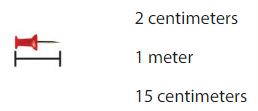
Answer:
By seeing the figure we can estimate the length of a thumbtack as 2 centimeters.
Question 20.
What is the best estimate of the height of a trampoline?
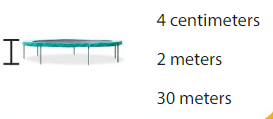
Answer:
By seeing the figure we can estimate the height of a trampoline as 4 centimeters.
Lesson 3.5 Multiply by 8
Explore and Grow
Use the tape diagram to find the product
3 × 8 = ____
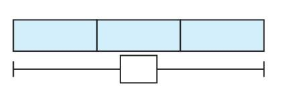
Answer: 24

Repeated Reasoning
Explain how you can use a different model to solve. Complete the table.

Answer: The tables for multiples of 8 are given below,

Think and Grow: Multiply by 8
Example
Find 5 × 8
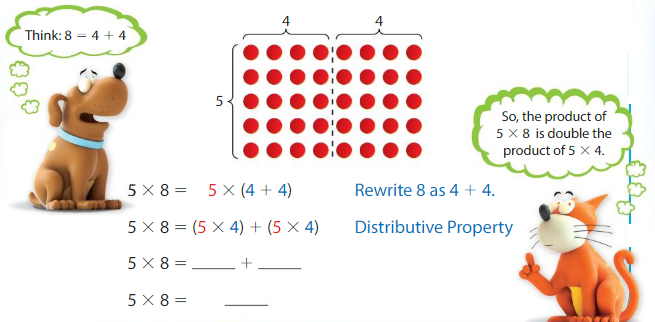
Explanation:
Rewrite 8 as 4 + 4.
We can find the product by using the Distributive Property.
5 × 8 = 5 × (4 + 4)
5 × 8 = (5 × 4) + (5 × 4)
5 × 8 = 20 + 20
5 × 8 = 40
Show and Grow
Find the product
Question 1.
4 × 8
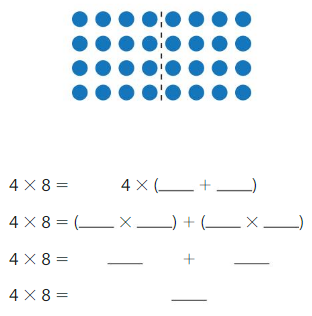
Answer: 32
Explanation:
Rewrite 8 as 4 + 4.
We can find the product by using the Distributive Property.
4 × 8 = 4 × (4 + 4)
4 × 8 = (4 × 4) + (4 × 4)
4 × 8 = 16 + 16
4 × 8 = 32
Question 2.
8 × 7
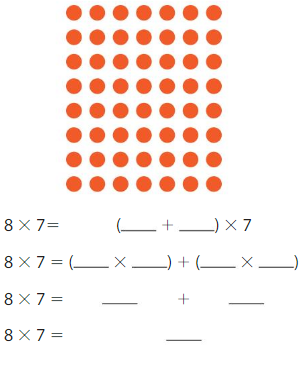
Answer: 56
Explanation:
Rewrite 8 as 4 + 4.
We can find the product by using the Distributive Property.
8 × 7 = (4 + 4) × 7
8 × 7 = (4 × 7) + (4 × 7)
8 × 7 = 28 + 28
8 × 7 = 56
Find the product
Question 3.
8 × 8
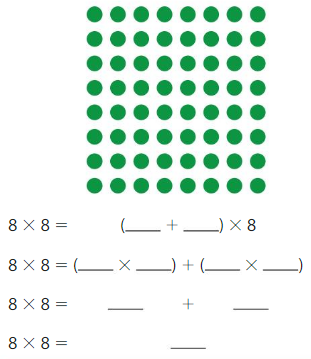
Answer: 64
Explanation:
Rewrite 8 as 4 + 4.
We can find the product by using the Distributive Property.
8 × 8 = (4 + 4) × 8
8 × 8 = (4 × 8) + (4 × 8)
8 × 8 = 32 + 32
8 × 8 = 64
Question 4.
3 × 8
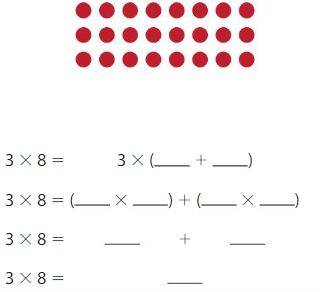
Answer: 24
Explanation:
Rewrite 8 as 4 + 4.
We can find the product by using the Distributive Property.
3 × 8 = 3 × (4 + 4)
3 × 8 = (3 × 4) + (3 × 4)
3 × 8 = 12 + 12
3 × 8 = 24
Question 5.
8 × 2 = ___
Answer: 16
Explanation:
Rewrite 8 as 4 + 4.
We can find the product by using the Distributive Property.
8 × 2 = (4 + 4) × 2
8 × 2 = (4 × 2) + (4 × 2)
8 × 2 = 8 + 8
8 × 2 = 16
Question 6.
7 × 8 = ___
Answer: 56
Explanation:
Rewrite 8 as 4 + 4.
We can find the product by using the Distributive Property.
7 × 8 = 7 × (4 + 4)
7 × 8 = (7 × 4) + (7 × 4)
7 × 8 = 28 + 28
7 × 8 = 56
Question 7.
8 × 6 = ____
Answer: 48
Explanation:
Rewrite 8 as 4 + 4.
We can find the product by using the Distributive Property.
8 × 6 = (4 + 4) × 6
8 × 6 = (4 × 6) + (4 × 6)
8 × 6 = 24 + 24
8 × 6 = 48
Question 8.
10 × 8 = ____
Answer: 80
Explanation:
Rewrite 8 as 4 + 4.
We can find the product by using the Distributive Property.
10 × 8 = 10 × (4 + 4)
10 × 8 = (10 × 4) + (10 × 4)
10 × 8 = 40 + 40
10 × 8 = 80
Compare
Question 9.

Answer: 0
Explanation:
Any number multiplied by 0 will be 0.
0 × 8 = 0 × (4 + 4)
0 × 8 = (0 × 4) + (0 × 4)
0 × 8 = 0 + 0
0 × 8 = 0
Question 10.

Answer: 72
Explanation:
Rewrite 8 as 4 + 4.
We can find the product by using the Distributive Property.
8 × 9 = (4 + 4) × 9
8 × 9 = (4 × 9) + (4 × 9)
8 × 9 = 36 + 36
8 × 9 = 72
Question 11.

Answer: 40
Explanation:
Rewrite 8 as 4 + 4.
We can find the product by using the Distributive Property.
8 × 5 = (4 + 4) × 5
8 × 5 = (4 × 5) + (4 × 5)
8 × 5 = 20 + 20
8 × 5 = 40
Question 12.

Answer: 8
Explanation:
Rewrite 8 as 4 + 4.
We can find the product by using the Distributive Property.
1 × 8 = 1 × (4 + 4)
1 × 8 = (1 × 4) + (1 × 4)
1 × 8 = 4 + 4
1 × 8 = 8
Compare
Question 13.
![]()
Answer: =
Explanation:
8 × 8 = 64
64 = 64
So, 8 × 8 = 64
Question 14.
![]()
Answer: <
Explanation:
Any number multiplied by 0 will be 0.
Any number multiplied by 1 will be the same number.
8 × 0 = 0
8 × 1 = 8
0 < 8
So, 8 × 0 < 8 × 1
Question 15.
![]()
Answer: >
Explanation:
8 × 6 = 48
5 × 8 = 40
48 > 40
8 × 6 > 5 × 8
Question 16.
Which One Doesn’tBelong?
Which expression does not belong with the other three?

Answer:
4 × (4 + 3) = 4 × 7 = 28
3 × (1 + 7) = 3 × 8 = 24
3 × (3 + 5) = 3 × 8 = 24
3 × (4 + 4) = 3 × 8 = 24
Thus the first doesn’t belong with the other three.
Think and Grow: Modeling Real Life
A marching band has 7 rows with 8 musicians in each row. There is also a row of 6 people who carry flags. How many people are in the marching band in all?
Multiplication equation:
Addition equation:

There are _______ people in the marching band in all.
Answer:
A marching band has 7 rows with 8 musicians in each row.
1 row – 8 musicians
7 rows – 7 × 8 musicians = 56 musicians
There is also a row of 6 people who carry flags.
56 + 6 = 62 people
Therefore there are 62 people in the marching band in all.
Show and Grow
Question 17.
A table has 3 rows with 8 prizes in each row. There is also a row of 4 prizes on the floor. How many prizes are there in all?
Answer: 28 prizes
Explanation:
A table has 3 rows with 8 prizes in each row.
1 row – 8 prizes
3 rows – 8 × 3 = 24 prizes
There is also a row of 4 prizes on the floor
24 + 4 = 28 prizes
Thus there are 28 prizes in all.
Question 18.
DIG DEEPER!
One section of a parking lot has 2 rows of 8 cars. Another section of the parking lot has 8 rows of 6 cars. How many cars are in the parking lot in all?
Answer: 64 cars
Explanation:
Given that,
One section of a parking lot has 2 rows of 8 cars.
2 × 8 = 16 cars
Another section of the parking lot has 8 rows of 6 cars.
8 × 6 = 48 cars
16 + 48 = 64 cars
Thus 64 cars are in the parking lot in all.
Question 19.
DIG DEEPER!
One building has 8 rows of 5 windows. Another building has 9 rows of 8 windows. How many windows are on the two buildings in all?
Answer: 112 windows
Explanation:
Given that,
One building has 8 rows of 5 windows.
8 × 5 = 40 windows
Another building has 9 rows of 8 windows.
9 × 8 = 72 windows
40 windows + 72 windows = 112 windows
Therefore 112 windows are on the two buildings in all.
Multiply by 8 Homework & Practice 3.5
Question 1.
8 × 6
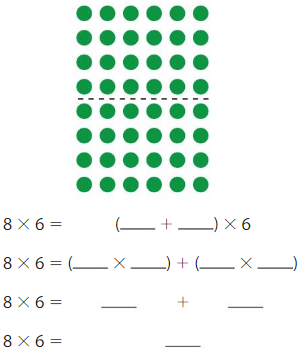
Answer: 48
Explanation:
Rewrite 8 as 4 + 4.
We can find the product by using the Distributive Property.
8 × 6 = (4 + 4) × 6
8 × 6 = (4 × 6) + (4 × 6)
8 × 6 = 24 + 24
8 × 6 = 48
Question 2.
2 × 8
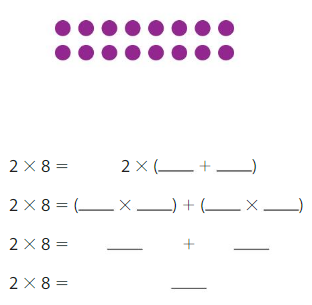
Answer: 16
Explanation:
Rewrite 8 as 4 + 4.
We can find the product by using the Distributive Property.
2 × 8 = 2 × (4 + 4)
2 × 8 = (2 × 4) + (2 × 4)
2 × 8 = 8 + 8
2 × 8 = 16
Question 3.
8 × 0 = ____
Answer: 0
Explanation:
Rewrite 8 as 4 + 4.
We can find the product by using the Distributive Property.
8 × 0 = (4 + 4) × 0
8 × 0 = (4 × 0) + (4 × 0)
8 × 0 = 0 + 0
8 × 0 = 0
Question 4.
4 × 8 = ____
Answer: 32
Explanation:
Rewrite 8 as 4 + 4.
We can find the product by using the Distributive Property.
4 × 8 = 4 × (4 + 4)
4 × 8 = (4 × 4) + (4 × 4)
4 × 8 = 16 + 16
4 × 8 = 32
Question 5.
8 × 10 = ____
Answer: 80
Explanation:
Rewrite 8 as 4 + 4.
We can find the product by using the Distributive Property.
8 × 10 = (4 + 4) × 10
8 × 10 = (4 × 10) + (4 × 10)
8 × 10 = 40 + 40
8 × 10 = 80
Question 6.
1 × 8 = ____
Answer: 8
Explanation:
Rewrite 8 as 4 + 4.
We can find the product by using the Distributive Property.
1 × 8 = 1 × (4 + 4)
1 × 8 = (1 × 4) + (1 × 4)
1 × 8 = 4+ 4
1 × 8 = 8
Question 7.

Answer: 24
Explanation:
Rewrite 8 as 4 + 4.
We can find the product by using the Distributive Property.
8 × 3 = (4 + 4) × 3
8 × 3 = (4 × 3) + (4 × 3)
8 × 3 = 12 + 12
8 × 3 = 24
Question 8.

Answer: 64
Explanation:
Rewrite 8 as 4 + 4.
We can find the product by using the Distributive Property.
8 × 8 = (4 + 4) × 8
8 × 8 = (4 × 8) + (4 × 8)
8 × 8 = 32 + 32
8 × 8 = 64
Question 9.

Answer: 56
Explanation:
Rewrite 8 as 4 + 4.
We can find the product by using the Distributive Property.
7 × 8 = 7 × (4 + 4)
7 × 8 = (7 × 4) + (7 × 4)
7 × 8 = 28 + 28
7 × 8 = 56
Question 10.

Answer: 72
Explanation:
Rewrite 8 as 4 + 4.
We can find the product by using the Distributive Property.
8 × 9 = (4 + 4) × 9
8 × 9 = (4 × 9) + (4 × 9)
8 × 9 = 36 + 36
8 × 9 = 72
Compare
Question 11.
![]()
Answer: >
Explanation:
8 × 3 = 24
8 × 2 = 16
24 > 16
So, 8 × 3 > 8 × 2
Question 12.

Answer: <
Explanation:
8 × 7 = 56
56 < 64
So, 8 × 7 < 64
Question 13.
![]()
Answer: =
Explanation:
8 × 1 = 8
1 × 8 = 8
8 = 8
So, 8 × 1 = 1 × 8
Question 14.
There are 8 batteries in a package. You buy 7 packages. How many batteries do you have?
Answer: 56 batteries
Explanation:
Given that,
There are 8 batteries in a package.
You buy 7 packages.
1 pack – 8 batteries
7 pack – 7 × 8 batteries
7 packs = 56 batteries
Therefore there are 56 batteries in all.
Question 15.
Patterns
Tell whether each statement is true or false. If false, explain.
The ones digit in multiples of 8 follows the pattern 8, 6, 4, 2, 0. _____
The product of an odd factor and 8 is always odd. ____
Answer:
The ones digit in multiples of 8 follows the pattern 8, 6, 4, 2, 0 is true. Because the multiples of 8 are 8, 16, 24, 32, 40.
Thus the statement is true.
The product of an odd factor and 8 is always odd is false. Because any odd number multiplied by an even number will be always an even number. Thus the statement is false.
Question 16.
Modeling Real Life
A trophy case has 4 shelves with 8 trophies on each shelf and 1 shelf with 3 trophies. How many trophies are there in all?

Answer: 35 trophies
Explanation:
Given,
A trophy case has 4 shelves with 8 trophies on each shelf and 1 shelf with 3 trophies.
1 shelf – 8 trophies
4 shelves – 4 × 8 trophies = 32 trophies
1 shelf – 3 trophies
32 + 3 = 35 trophies
Therefore there are 35 trophies in all.
Question 17.
DIG DEEPER!
In a science experiment, one group of students tests 2 rows of 8 magnets. A different group tests 1 row of 8 magnets. How many magnets do they test in all?
Answer: 24 magnets
Explanation:
Given that,
In a science experiment, one group of students tests 2 rows of 8 magnets.
2 × 8 = 16 magnets
A different group tests 1 row of 8 magnets.
1 × 8 = 8 magnets
16 + 8 = 24 magnets
Thus there are 24 magnets in all.
Review & Refresh
Show and write the time.
Question 18.
half past 3
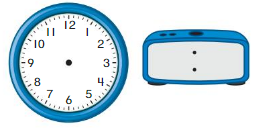
Answer: 3:30
Explanation:
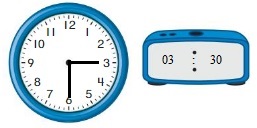
Half is nothing but 30 minutes.
So, half past 30 is 3:30
Question 19.
quarter to 11
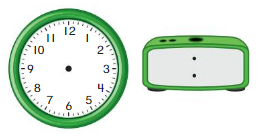
Answer: 10:45
Explanation:
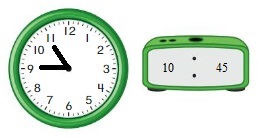
The quarter is nothing but 15. Quarter to 11 means 10:45.
Lesson 3.6 Multiply by 9
Explore and Grow
Write an equation to match the array
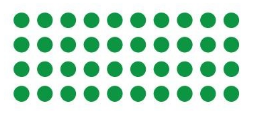
Cross out the last column. Write an equation to match the new array
____ × ____ = ____
Answer:
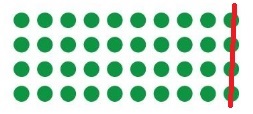
Now there are 4 rows of 9 columns.
So the equation to match the new arrays is 4 × 9 = 36
Repeated Reasoning
Explain how multiplying by 10 can help you multiple by 9. Complete the table.

Answer:
The multiples of 9 are given in the below table.

Think and Grow: Multiply by 9
Example
Find 6 × 9
One way: Use the Distributive Property. Rewrite 9 as 5 + 4
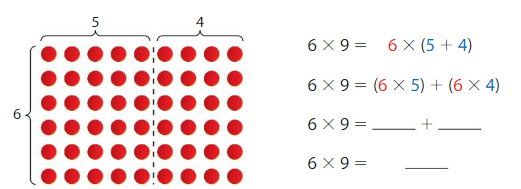
Distributive Property (with subtraction)
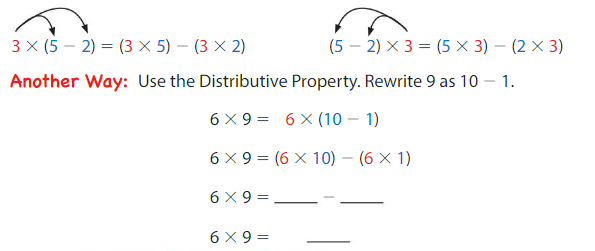
Answer: 54
Explanation:
Rewrite 9 as 5 + 4
6 × 9 = 6 × (5 + 4)
6 × 9 = (6 × 5) + (6 × 4)
6 × 9 = 30 + 24
6 × 9 = 54
Distribution property with subtraction
Rewrite 9 as 10 – 1
6 × 9 = 6 × (10 – 1)
6 × 9 = (6 × 10) – (6 × 1)
6 × 9 = 60 – 6
6 × 9 = 54
Show and Grow
Question 1.
Find 3 × 9
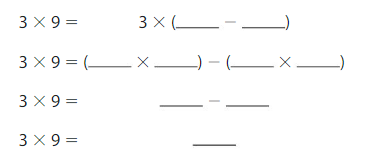
Answer: 27
Explanation:
Distribution property with subtraction
Rewrite 9 as 10 – 1
3 × 9 = 3 × (10 – 1)
3 × 9 = (3 × 10) – (3 × 1)
3 × 9 = 30 – 3
3 × 9 = 27
Apply and Grow: Practice
Find the product
Question 2.
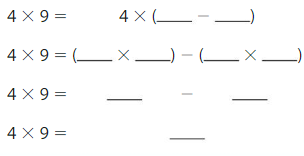
Answer: 36
Explanation:
Distribution property with subtraction
Rewrite 9 as 10 – 1
4 × 9 = 4 × (10 – 1)
4 × 9 = (4 × 10) – (4 × 1)
4 × 9 = 40 – 4
4 × 9 = 36
Question 3.
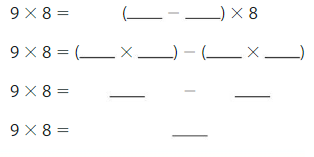
Answer: 72
Explanation:
Distribution property with subtraction
Rewrite 9 as 10 – 1
9 × 8 = (10 – 1) × 8
9 × 8 = (10 × 8) – (1 × 8)
9 × 8 = 80 – 8
9 × 8 = 72
Question 4.
9 × 7 = ___
Answer: 63
Explanation:
Distribution property with subtraction
Rewrite 9 as 10 – 1
9 × 7 = (10 – 1) × 7
9 × 7 = (10 × 7) – (1 × 7)
9 × 7 = 70 – 7
9 × 7 = 63
Question 5.
9 × 1 = ___
Answer: 9
Explanation:
Distribution property with subtraction
Rewrite 9 as 10 – 1
9 × 1 = (10 – 1) × 1
9 × 1 = (10 × 1) – (1 × 1)
9 × 1 = 10 – 1
9 × 1 = 9
Question 6.
2 × 9 = ____
Answer: 18
Explanation:
Distribution property with subtraction
Rewrite 9 as 10 – 1
2 × 9 = 2 × (10 – 1)
2 × 9 = (2 × 10) – (2 × 1)
2 × 9 = 20 – 2
2 × 9 = 18
Question 7.
0 × 9 = ____
Answer: 0
Explanation:
Distribution property with subtraction
Rewrite 9 as 10 – 1
0 × 9 = 0 × (10 – 1)
0 × 9 = (0 × 10) – (0 × 1)
0 × 9 = 0 – 0
0 × 9 = 0
Question 8.

Answer: 90
Explanation:
Distribution property with subtraction
Rewrite 9 as 10 – 1
9 × 10 = (10 – 1) × 10
9 × 10 = (10 × 10) – (1 × 10)
9 × 10 = 100 – 10
9 × 10 = 90
Question 9.
![]()
Answer: 45
Explanation:
Distribution property with subtraction
Rewrite 9 as 10 – 1
9 × 5 = (10 – 1) × 5
9 × 5 = (10 × 5) – (1 × 5)
9 × 5 = 50 – 5
9 × 5 = 45
Question 10.
![]()
Answer: 72
Explanation:
Distribution property with subtraction
Rewrite 9 as 10 – 1
8 × 9 = 8 × (10 – 1)
8 × 9 = (8 × 10) – (8 × 1)
8 × 9 = 80 – 8
8 × 9 = 72
Question 11.

Answer: 81
Explanation:
Distribution property with subtraction
Rewrite 9 as 10 – 1
9 × 9 = 9 × (10 – 1)
9 × 9 = (9 × 10) – (9 × 1)
9 × 9 = 90 – 9
9 × 9 = 81
Find the missing factor
Question 12.
9 × ____ = 0
Answer: 0
Explanation:
Let the missing factor be p.
9 × p = 0
p = 0/9
p = 0
Thus the missing factor is 0.
Question 13.
___ × 9 = 45
Answer: 5
Explanation:
Let the missing factor be q.
q × 9 = 45
q = 45/9
q = 5
Thus the missing factor is 5.
Question 14.
9 × ____ = 36
Answer: 4
Explanation:
Let the missing factor be s.
9 × s = 36
s = 36/9
s = 4
Thus the missing factor is 4.
Question 15.
A softball team has 9 positions and 2 players for each position. How many players are on the team?

Answer: 18 players
Explanation:
Given that,
A softball team has 9 positions and 2 players for each position.
9 × 2 = 18 players
Thus there are 18 players on the team.
Question 16.
Number Sense
Which are not multiples of 9?

Answer: The numbers that are not the multiples of 9 are 50, 42, 10.
Think and Grow: Modeling Real Life
In geocaching, people search for a cache, or collection of objects, using a GPS device. You go geocaching for 9 days. You find 2 caches each day. Your goal is to find 20 caches. Do you reach your goal?
Multiplication equation:

You ______ reach your goal.
Answer: Yes
Explanation:
Given,
In geocaching, people search for a cache, or collection of objects, using a GPS device.
You go geocaching for 9 days.
You find 2 caches each day.
1 day – 2 caches
9 days – 9 × 2 caches = 18 caches
Your goal is to find 20 caches.
20 – 18 = 2 caches
Yes, you can reach your goal.
Show and Grow
Question 17.
You have 9 math problems for homework. You spend 4 minutes on each problem. Your goal is to finish your math homework in 40 minutes. Do you reach your goal?
Answer: Yes
Explanation:
Given,
You have 9 math problems for homework. You spend 4 minutes on each problem.
1 problem – 4 minutes
9 problems – 9 × 4 minutes = 36 minutes
Your goal is to finish your math homework in 40 minutes.
40 – 36 = 4 minutes
Yes, you reach your goal.
Question 18.
DIG DEEPER!
You exercise for 6 days. You exercise for 10 minutes each day. Your friend exercises for 8 days. Your friend exercises for 9 minutes each day. Who exercises the most minutes?
Answer: Your friend
Explanation:
Given,
You exercise for 6 days. You exercise for 10 minutes each day.
1 day – 10 minutes
6 days – 6 × 10 minutes = 60 minutes
Your friend exercises for 8 days. Your friend exercises for 9 minutes each day.
1 day – 9 minutes
8 days – 8 × 9 minutes = 72 minutes
Thus your friend exercises the most minutes.
Question 19.
DIG DEEPER!
Your school is collecting cans for a food drive. Seven students from your class each collect 9 cans. Eight students from your friend’s class each collect 8 cans. Which class collects the most cans?
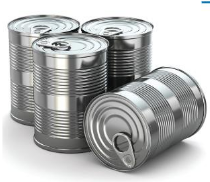
Answer: Your friends class collects the most cans
Explanation:
Given,
Your school is collecting cans for a food drive. Seven students from your class each collect 9 cans.
1 student – 9 cans
7 students – 7 × 9 cans = 63 cans
Eight students from your friend’s class each collect 8 cans.
1 student – 8 cans
8 students – 8 × 8 cans = 64 cans
Thus Your friend’s class collects the most cans.
Multiply by 9 Homework & Practice 3.6
Find the product
Question 1.
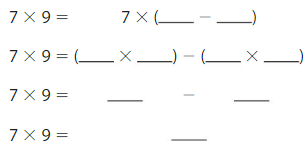
Answer: 63
Explanation:
Rewrite 9 as 10 – 1
We can find the product by using the distributive property with subtraction
7 × 9 = 7 × (10 – 1)
7 × 9 = (7 × 10) – (7 × 1)
7 × 9 = 70 – 7
7 × 9 = 63
Question 2.
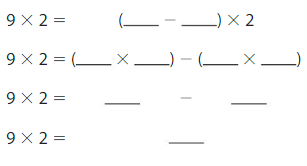
Answer: 18
Explanation:
Rewrite 9 as 10 – 1
We can find the product by using the distributive property with subtraction.
9 × 2 = (10 – 1) × 2
9 × 2 = (10 × 2) – (1 × 2)
9 × 2 = 20 – 2
9 × 2 = 18
Question 3.
1 × 9 = ____
Answer: 9
Explanation:
Rewrite 9 as 10 – 1
We can find the product by using the distributive property with subtraction.
1 × 9 = 1 × (10 – 1)
1 × 9 = (1 × 10) – (1 × 1)
1 × 9 = 10 – 1
1 × 9 = 9
Question 4.
9 × 9 = _____
Answer: 81
Explanation:
Rewrite 9 as 10 – 1
We can find the product by using the distributive property with subtraction.
9 × 9 = 9 × (10 – 1)
9 × 9 = (9 × 10) – (9 × 1)
9 × 9 = 90 – 9
9 × 9 = 81
Question 5.
10 × 9 = ____
Answer: 90
Explanation:
Rewrite 9 as 10 – 1
We can find the product by using the distributive property with subtraction.
10 × 9 = 10 × (10 – 1)
10 × 9 = (10 × 10) – (10 × 1)
10 × 9 = 100 – 10
10 × 9 = 90
Question 6.
3 × 9 = _____
Answer: 27
Explanation:
Rewrite 9 as 10 – 1
We can find the product by using the distributive property with subtraction.
3 × 9 = 3 × (10 – 1)
3 × 9 = (3 × 10) – (3 × 1)
3 × 9 = 30 – 3
3 × 9 = 27
Question 7.

Answer: 72
Explanation:
Rewrite 9 as 10 – 1
We can find the product by using the distributive property with subtraction.
9 × 8 = (10 – 1) × 8
9 × 8 = (10 × 8) – (1 × 8)
9 × 8 = 80 – 8
9 × 8 = 72
Question 8.

Answer: 54
Explanation:
Rewrite 9 as 10 – 1
We can find the product by using the distributive property with subtraction.
9 × 6 = (10 – 1) × 6
9 × 6 = (10 × 6) – (1 × 6)
9 × 6 = 60 – 6
9 × 6 = 54
Question 9.

Answer: 36
Explanation:
Rewrite 9 as 10 – 1
We can find the product by using the distributive property with subtraction.
4 × 9 = 4 × (10 – 1)
4 × 9 = (4 × 10) – (4 × 1)
4 × 9 = 40 – 4
4 × 9 = 36
Question 10.

Answer: 0
Explanation:
Rewrite 9 as 10 – 1
We can find the product by using the distributive property with subtraction.
0 × 9 = 0 × (10 – 1)
0 × 9 = (0 × 10) – (0 × 1)
0 × 9 = 0
0 × 9 = 0
Find the missing factor
Question 11.
9 × ___ = 9
Answer: 1
Explanation:
Let the missing factor be a.
9 × a = 9
a = 9/9
a = 1
Therefore the missing factor is 1.
Question 12.
___ × 5 = 45
Answer: 9
Explanation:
Let the missing factor be r.
r × 5 = 45
r = 45/5
r = 9
Therefore the missing factor is 9.
Question 13.
90 = ___ × 10
Answer: 9
Explanation:
Let the missing factor be p.
90 = p × 10
p = 90/10
p = 9
Therefore the missing factor is 9.
Question 14.
You see 9 chipmunks on your walk to school. You see twice as many pigeons. How many pigeons do you see?
Answer: 18
Explanation:
Given that,
You see 9 chipmunks on your walk to school. You see twice as many pigeons.
Let the number of pigeons is x.
twice = 2x
2 × 9 = 18
Thus there are 18 pigeons.
Question 15.
Patterns
Use the table

What pattern do you notice in the ones digits? the tens digits?
What do you notice about the sum of the digits for each multiple of 9?
Answer:
The pattern in ones digit is 9, 8, 7, 6, 5, 4, 3, 2, 1, 0.
The pattern in tens digit is 0, 1, 2, 3, 4, 5, 6, 7, 8, 9.
I observe that the sum of digits for each multiple of 9 is 9.
18 = 1 + 8 = 9
27 = 2 + 7 = 9
36 = 3 + 6 = 9
45 = 4 + 5 = 9
54 = 5 + 4 = 9
63 = 6 + 3 = 9
72 = 7 + 2 = 9
81 = 8 + 1 = 9
90 = 9 + 0 = 9
Question 16.
YOU BE THE TEACHER
Your friend says the product of 7 × 9 is 69. Is your friend correct? Explain.
Answer: My friend is incorrect. Because the product of 7 × 9 is 63.
Question 17.
Modeling Real Life
You sell 8 orchids. You want to raise $70. Do you meet your goal?
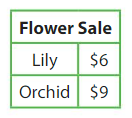
Answer:
Given,
You sell 8 orchids.
The cost of 1 orchid – $9
8 orchids – 8 × $9 = $72
You want to raise $70.
$70 – $72 = -$2
No, I didn’t reach my goal.
DIG DEEPER!
Newton sells 9 lilies. Descartes sells 5 orchids. Who raises the most money?

Answer:
Given that,
Newton sells 9 lilies. Descartes sells 5 orchids.
Cost of lily – $6
9 × $6 = $54
Cost of Orchid – $9
5 × $9 = $45
Thus Newton raises more money.
Review & Refresh
Complete the equation.
Question 18.
4 × 5 = 5 × ____
Answer: 4
Explanation:
The commutative property is a math rule that says that the order in which we multiply numbers does not change the product.
So, 4 × 5 = 5 × 4
Question 19.
8 × ____ = 7 × 8
Answer: 7
Explanation:
The commutative property is a math rule that says that the order in which we multiply numbers does not change the product.
8 × 7 = 7 × 8
Lesson 3.7 Practice Multiplication Strategies
Explore and Grow
Show how to find the product
6 × 7 = ____
Answer: 42
Explanation:
Multiply the two numbers 6 and 7.
6 × 7 = 42
Reasoning
What other strategies can you use to solve?
Answer: The other strategy to find the product is by using the distributive property.
Rewrite 7 as 5 + 2
6 × 7 = 6 × (5 + 2)
6 × 7 = (6 × 5) + (6 × 2)
6 × 7 = 30 + 12
6 × 7 = 42
Think and Grow: Practice Multiplication Strategies
Example
Use any strategy to find 4 × 3.
One way: Use a number line. Skip count by 3s four times.

Another way: Use the Distributive Property
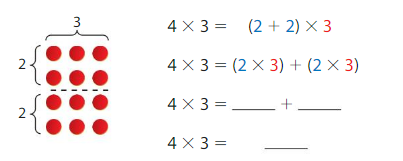
Answer:
Using Distributive Property
Rewrite 4 as 2 + 2.
4 × 3 = (2 + 2) × 3
4 × 3 = (2 × 3) + (2 × 3)
4 × 3 = 6 + 6
4 × 3 = 12
Show and Grow
Use any strategy to find the product
Question 1.
5 × 6 = ____
Answer: 30
Explanation:
Using Distributive Property
Rewrite 6 as 3 + 3.
5 × 6 = 5 × (3 + 3)
5 × 6 = (5 × 3) + (5 × 3)
5 × 6 = 15 + 15
5 × 6 = 30
Question 2.
3 × 8 = ____
Answer: 24
Explanation:
Using Distributive Property.
Rewrite 8 as 4 + 4.
3 × 8 = 3 × (4 + 4)
3 × 8 = (3 × 4) + (3 × 4)
3 × 8 = 12 + 12
3 × 8 = 24
Question 3.
7 × 8 = ____
Answer: 56
Explanation:
Using Distributive Property
Rewrite 8 as 4 + 4.
7 × 8 = 7 × (4 + 4)
7 × 8 = (7 × 4) + (7 × 4)
7 × 8 = 28 + 28
7 × 8 = 56
Question 4.
9 × 6 = ____
Answer: 54
Explanation:
Using Distributive Property
Rewrite 6 as 3 + 3.
9 × 6 = 9 × (3 + 3)
9 × 6 = (9 × 3) + (9 × 3)
9 × 6 = 27 + 27
9 × 6 = 54
Apply and Grow: Practice
Use any strategy to find the product
Question 5.
5 × 9 = _____
Answer: 45
Explanation:
Using Distributive Property
Rewrite 9 as 5 + 4.
5 × 9 = 5 × (5 + 4)
5 × 9 = (5 × 5) + (5 × 4)
5 × 9 = 25 + 20
5 × 9 = 45
Question 6.
5 × 7 = ____
Answer: 35
Explanation:
Using Distributive Property
Rewrite 7 as 5 + 2.
5 × 7 = 5 × (5 + 2)
5 × 7 = (5 × 5) + (5 × 2)
5 × 7 = 25 + 10
5 × 7 = 35
Question 7.
10 × 3 = ____
Answer: 30
Explanation:
Using Distributive Property
Rewrite 10 as 5 + 5.
10 × 3 = (5 + 5) × 3
10 × 3 = (5 × 3) + (5 × 3)
10 × 3 = 15 + 15
10 × 3 = 30
Question 8.
7 × 1 = ____
Answer: 7
Explanation:
Using Distributive Property
Rewrite 7 as 5 + 2.
7 × 1 = (5 + 2) × 1
7 × 1 = (5 × 1) + (2 ×1)
7 × 1 = 5 + 2
7 × 1 = 7
Question 9.
5 × 5 = ____
Answer: 25
Explanation:
Using Distributive Property
Rewrite 5 as 2 + 3
5 × 5 = 5 × (2 + 3)
5 × 5 = (5 × 2) + (5 × 3)
5 × 5 = 10 + 15
5 × 5 = 25
Question 10.
4 × 9 = ____
Answer: 36
Explanation:
Using Distributive Property
Rewrite 4 as 2 + 2.
4 × 9 = (2 + 2) × 9
4 × 9 = (2 × 9) + (2 × 9)
4 × 9 = 18 + 18
4 × 9 = 36
Question 11.

Answer: 48
Explanation:
Using Distributive Property.
Rewrite 8 as 4 + 4.
8 × 6 = (4 + 4) × 6
8 × 6 = (4 × 6) + (4 × 6)
8 × 6 = 24 + 24
8 × 6 = 48
Question 12.

Answer: 28
Explanation:
Using Distributive Property
Rewrite 4 as 2 + 2.
4 × 7 = (2 + 2) × 7
4 × 7 = (2 × 7) + (2 × 7)
4 × 7 = 14 + 14
4 × 7 = 28
Question 13.

Answer: 10
Explanation:
Using Distributive Property
Rewrite 5 as 2 + 3
5 × 2 = (2 + 3) × 2
5 × 2 = (2 × 2) + (2 × 3)
5 × 2 = 4 + 6
5 × 2 = 10
Name the strategy or property used to solve
Question 14.
9 × 9 = 9 × (10 – 1)
9 × 9 = (9 × 10) – (9 × 1)
9 × 9 = 90 – 9
9 × 9 = 81
Answer: Distributive property with subtraction
The distributive property of multiplication over subtraction is like the distributive property of multiplication over addition. You can subtract the numbers and then multiply, or you can multiply and then subtract.
Question 15.
2 × 4 = 8
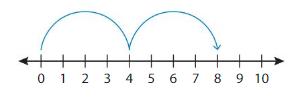
Answer: Number line
Question 16.
DIG DEEPER!
Use known facts to find 6 × 12. Explain your strategy 6 × 12 = ____
Answer: 72
Explanation:
Rewrite 6 as 3 + 3.
6 × 12 = (3 + 3) × 12
6 × 12 = (3 × 12) + (3 × 12)
6 × 12 = 36 + 36
6 × 12 = 72
Think and Grow: Modeling Real Life
You want to make a dragon that is 25 feet long for a parade. You have 6 pieces of fabric that are each 5 feet long. Do you have enough fabric to make the dragon?


You _____ have enough fabric to make the dragon.
Answer:
Given,
You want to make a dragon that is 25 feet long for a parade.
You have 6 pieces of fabric that are each 5 feet long
6 × 5 = 30

Yes, you have enough fabric to make the dragon.
Show and Grow
Question 17.
A book is 70 pages long. You read 9 pages each day for one week. Do you finish the book in one week?
Answer: No
Explanation:
Given,
A book is 70 pages long. You read 9 pages each day for one week.
Convert week to day.
1 day – 9 pages
7 days – 7 × 9 pages = 63 pages
63 – 70 = -7
Thus you did not finish the book in one week.
Question 18.
DIG DEEPER!
You buy 4 packs of juice boxes. How many juice boxes do you buy in all?
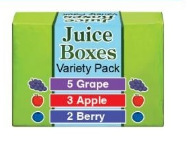
Explain how you solved the problem.
Answer: 40 juice boxes
Explanation:
You buy 4 packs of juice boxes.
1 pack contains 5 grape, 3 apple, 2 berry
4 packs = 5 grapes × 4, 3 apple × 4, 2 berry × 4
= 20 grape, 12 apple, 8 berry
= 20 + 12 + 8 = 40
Thus you buy 40 juice boxes in all.
Practice Multiplication Strategies Homework & Practice 1.1
Use any strategy to find the product
Question 1.
0 × 6 = ____
Answer: 0
Explanation:
Any number multiplied by 0 will be always 0.
Question 2.
2 × 10 = ____
Answer: 20
Explanation:
You can find the product by using the distributive property.
Rewrite 10 as 5 + 5.
2 × 10 = 2 × (5 + 5)
2 × 10 = (2 × 5) + (2 × 5)
2 × 10 = 10 + 10
2 × 10 = 20
Question 3.
1 × 9 = ____
Answer: 9
Explanation:
You can find the product by using the distributive property.
Rewrite 9 as 6 + 3
1 × 9 = 1 × (6 + 3)
1 × 9 = (1 × 6) + (1 × 3)
1 × 9 = 6 + 3
1 × 9 = 9
Question 4.

Answer: 20
Explanation:
You can find the product by using the distributive property.
Rewrite 4 as 2 + 2.
4 × 5 = (2 + 2) × 5
4 × 5 = (2 × 5) + (2 × 5)
4 × 5 = 10 + 10
4 × 5 = 20
Question 5.

Answer: 72
Explanation:
You can find the product by using the distributive property.
Rewrite 9 as 6 + 3
8 × 9 = 8 × (6 + 3)
8 × 9 = (8 × 6) + (8 × 3)
8 × 9 = 48 + 24
8 × 9 = 72
Question 6.

Answer: 21
Explanation:
You can find the product by using the distributive property.
Rewrite 7 as 5 + 2.
7 × 3 = (5 + 2) × 3
7 × 3 = (5 × 3) + (2 × 3)
7 × 3 = 15 + 6
7 × 3 = 21
Name the strategy or property used to solve.
Question 7.
3 × 5 = ?
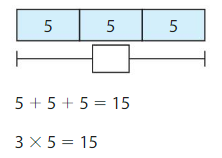
Answer: The strategy used for the above product is table diagram.
Question 8.
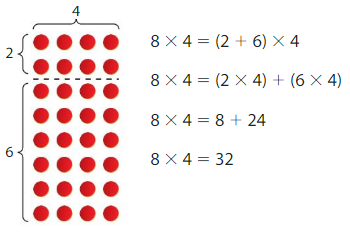
Answer: Distributive Property of Multiplication.
Explanation:
According to the distributive property, multiplying the sum of two or more addends by a number will give the same result as multiplying each addend individually by the number and then adding the products together.
Question 9.
Logic
Without multiplying, how can you tell which product will be greater,6 × 3 or 6 × 4? Explain.
Answer: We can say the greater product by comparing the multiples 4 is greater than 3. So, 6 × 3 is less than 6 × 4.
Question 10.
YOU BE THE TEACHER
Descartes uses the Distributive Property to solve 5 × 8. Is he correct? Explain.
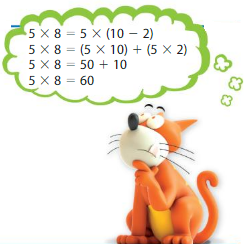
Answer: No Descartes solution is incorrect.
Explanation:
Rewrite 8 as 10 – 2.
5 × 8 = 5 × (10 – 2)
5 × 8 = (5 × 10) – (5 × 2)
5 × 8 = 50 – 10
5 × 8 = 40
Question 11.
Modeling Real Life
You order 24 eggs from a farmer. The farmer has 8 chickens. Each chicken lays 3 eggs. Does the farmer have enough eggs for your order? Explain.
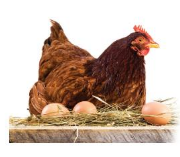
Answer:
Given that,
You order 24 eggs from a farmer.
The farmer has 8 chickens.
Each chicken lays 3 eggs.
8 × 3 eggs = 24 eggs
Yes, the farmer have enough eggs for your order.
Question 12.
DIG DEEPER!
You have 3 piles of sports cards. There are 3 baseball cards, 2 basketball cards, and 4 football cards in each pile. How many sports cards do you have in all?
Answer:
Given that,
You have 3 piles of sports cards.
There are 3 baseball cards, 2 basketball cards, and 4 football cards in each pile.
1 pile – 3 basketball cards, 2 basketball cards, and 4 football cards
3 piles – 9 basketball cards, 6 basketball cards, and 12 football cards
= 9 + 6 + 12 = 27 cards
Thus you have 27 sports cards in all.
Review & Refresh
Find the sum
Question 13.

Answer: 92
Explanation:
Add all the three numbers.
32
+13
+47
92
Question 14.

Answer: 84
Explanation:
Add all the three numbers.
46
+14
+24
84
Question 15.

Answer: 72
Explanation:
Add all the three numbers.
55
+10
+12
72
Question 16.

Answer: 63
Explanation:
Add all the three numbers.
21
+13
+29
63
Lesson 3.8 Multiply Three Factors
Explore and Grow
Model 2 arrays that each have 4 rows and 3 columns. Draw your model. Complete the equation for the arrays.
2 × ____ ×____ = _____
Answer: 2 × 4 × 3 = 24
Model 3 arrays that each have 2 rows and 4 columns. Draw your model. Complete the equation for the arrays.
3 × ___ × ____ = ____
Answer: 3 × 2 × 4 = 24
Structure
Compare the equations. How are they the same? How are they different?
Answer: The solutions for both equations are the same. But the arrays and rows and columns are different.
Think and Grow: Associative Property of Multiplication
Associative Property of Multiplication: Changing the grouping of factors does not change the product
Example
Find (5 × 2) × 3

Answer:
Associative Property of Multiplication
First find the factors in the bracket.
5 × 2 = 10
10 × 3 = 30
Commutative Property of Multiplication
5 × (2 × 3)
2 × 3 = 6
5 × 6 = 30
Example
Find 4 × (7 × 2)
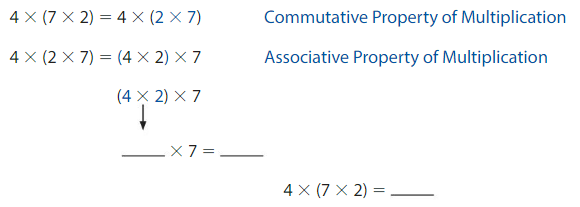
4 × (7 × 2) = 4 × (2 × 7)
4 × (2 × 7) = (4 × 2) × 7
(4 × 2) × 7 = 8 × 7 = 56
4 × (2 × 7) = 4 × 14 =56
Show and Grow
Find the product
Question 1.
(3 × 2) × 2 = _____
Answer: 12
Explanation:
First find the factors in the bracket.
(3 × 2) × 2
3 × 2 = 6
6 × 2 = 12
Question 2.
3 × (4 × 3) = ____
Answer: 36
Explanation:
First find the factors in the bracket.
3 × (4 × 3)
(4 × 3) = 12
3 × 12 = 36
Apply and Grow: Practice
Find the product
Question 3.
(3 × 2) × 7 = ____
Answer: 42
Explanation:
First find the factors in the bracket.
3 × 2 = 6
6 × 7 = 42
Question 4.
5 × (4 × 2) = _____
Answer: 40
Explanation:
First find the factors in the bracket.
4 × 2 = 8
5 × 8 = 40
Question 5.
(3 × 6) × 2 = ____
Answer: 36
Explanation:
First find the factors in the bracket.
3 × 6 = 18
18 × 2 = 36
Question 6.
3 × (5 × 3) = ____
Answer: 45
Explanation:
First find the factors in the bracket.
5 × 3 = 15
3 × 15 = 45
Question 7.
(4 × 10) × 2 = ____
Answer: 80
Explanation:
First find the factors in the bracket.
4 × 10 = 40
40 × 2 = 80
Question 8.
6 × (0 × 7) = ____
Answer: 0
Explanation:
First find the factors in the bracket.
0 × 7 = 0
6 × 0 = 0
Tell whether the equation is true or false. Explain.
Question 9.
![]()
Answer: True
Explanation:
First find the factors in the bracket.
5 × 3 = 15
15 × 4 = 60
5 × 4 = 20
3 × 20 = 60
Thus the above statement is true.
Question 10.

Answer: False
Explanation:
First find the factors in the bracket.
2 × 6 = 12
4 × 12 = 48
8 × 4 = 32
48 ≠ 32
Thus the above statement is false.
Question 11.
A water ride has 4 log boats. Each boat has 2 sections with 2 seats in each section. How many seats does the water ride have?

Answer:
Given that,
A water ride has 4 log boats. Each boat has 2 sections with 2 seats in each section.
1 section – 2 seats
2 sections – 2 × 2 seats = 4 seats
4 × 4 seats = 16 seats
Therefore the water ride have 16 seats.
Question 12.
DIG DEEPER!
Complete the square so that the product of the numbers in each row and each column equals 24.
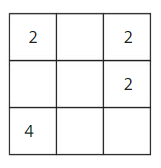
Answer:
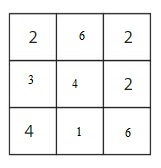
Think and Grow: Modeling Real Life
There are 26 students in your class. Your teacher brings in 4 boxes of muffins. Each box has 4 packages with 2 muffins in each package. Are there enough muffins for the class?
Multiplication equation:
There ______ enough muffins for the class.
Answer:
Given,
There are 26 students in your class.
Your teacher brings in 4 boxes of muffins.
Each box has 4 packages with 2 muffins in each package.
1 package – 2 muffins
4 packages – 2 × 4 packages = 8 packages
4 × 8 packages = 32 packages
32 – 26 = 6
Thus there are enough muffins for the class.
Show and Grow
Question 13.
Newton needs to send out 50 letters. He buys 4 sheets of stamps. Each sheet has 2 rows with 6 stamps in each row. Does Newton have enough stamps to send out all the letters?
Answer:
Given that,
Newton needs to send out 50 letters.
He buys 4 sheets of stamps.
Each sheet has 2 rows with 6 stamps in each row.
2 × 6 = 12 stamps
4 × 12 stamps = 48 stamps
48 – 50 = -2
Newton does not have enough stamps to send out all the letters.
Question 14.
DIG DEEPER!
There are 60 people in line to ride the tram at a zoo. There are 5 benches on each tram car. Two people fit on each bench. The tram is 5 cars long. How many people will have to wait for the next tram?

Answer:
Given that,
There are 60 people in line to ride the tram at a zoo.
There are 5 benches on each tram car.
Two people fit on each bench.
5 × 2 = 10 people fit on 5 benches
The tram is 5 cars long
5 × 10 = 50 people
50 – 60 = -10 people
Thus 10 people will have to wait for the next time.
Multiply Three Factors Homework & Practice 3.8
Find the product
Question 1.
(2 × 4) × 1 = _____
Answer: 8
Explanation:
First multiply the factors in the bracket.
2 × 4 = 8
8 × 1 = 8
Thus (2 × 4) × 1 = 8
Question 2.
2 × (3 × 3) = ____
Answer: 18
Explanation:
First multiply the factors in the bracket.
3 × 3 = 9
2 × 9 = 18
Thus 2 × (3 × 3) = 18
Question 3.
(4 × 2) × 9 = _____
Answer: 72
Explanation:
First multiply the factors in the bracket.
4 × 2 = 8
8 × 9 = 72
Thus (4 × 2) × 9 = 72
Question 4.
2 × (8 × 5) = _____
Answer: 80
Explanation:
First multiply the factors in the bracket.
8 × 5 = 40
2 × 40 = 80
So, 2 × (8 × 5) = 80
Tell whether the equation is true or false. Explain
Question 5.
![]()
Answer: False
Explanation:
Any number multiplied by 0 will be always 0.
0 × 3 = 0
7 × 0 = 0
7 × 3 = 21
Thus the equation 7 × (0 × 3) = 7 ×3 is false.
Question 6.
![]()
Answer: True
Explanation:
6 × 5 = 30
2 × 30 = 60
6 × 2 = 12
12 × 5 = 60
Thus the equation 2 × (6 × 5) = (6 × 2) × 5 is false.
Question 7.
A sudoku puzzle is made of 9 large squares. Each large square is made of an array with 3 rows and 3 columns of small squares. How many small squares are there?
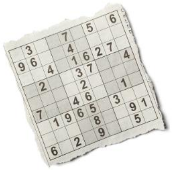
Answer: 81 small squares
Explanation:
Given that,
A sudoku puzzle is made of 9 large squares.
Each large square is made of an array with 3 rows and 3 columns of small squares.
3 × 3 = 9 small squares in each large square
9 × 9 = 81 small squares in sudoko puzzle.
Question 8.
DIG DEEPER!
Use the number of cards to complete the equations.

Answer:
Solve the equations by using the number of cards.
![]()
Question 9.
YOU BE THE TEACHER
Your friend says that (2 × 1) × 7 is equal to 2 × (1 × 7). Is your friend correct? Explain.
Answer:
Given,
Your friend says that (2 × 1) × 7 is equal to 2 × (1 × 7).
(2 × 1) × 7 = 2 × 7 = 14
2 × (1 × 7) = 2 × 7 = 14
Thus your friend is correct.
Question 10.
Writing
How do you know 2 × 9 × 5 is the same as 10 × 9?
Answer:
2 × 9 × 5 = 18 × 5 = 90
10 × 9 = 90
Thus the expression is correct.
Question 11.
Modeling Real Life
There are 64 soccer players. Some coaches bring 7 boxes of protein bars. Each box has 5 packages with 2 protein bars in each package. Are there enough protein bars for each soccer player to get one?
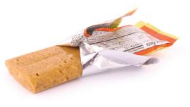
Answer:
Given that,
There are 64 soccer players.
Some coaches bring 7 boxes of protein bars.
Each box has 5 packages with 2 protein bars in each package.
1 package – 2 protein bars
5 packages – 2 × 5 = 10 protein bars
7 × 10 = 70 protein bars
70 – 64 = 6
Thus each soccer player get enough protein bars.
Review & Refresh
Question 12.
A training academy certifies 12 fire fighting Dalmations. They divide the Dalmations among different cities with 3 Dalmatians in each city. How many cities receive firefighting Dalmations?
____ ÷ _____ = _____
Answer:
Given that,
A training academy certifies 12 fire fighting Dalmations. They divide the Dalmations among different cities with 3 Dalmatians in each city.
12 ÷ 3 = 4
Therefore 4 cities receive firefighting Dalmations.
Lesson 3.9 More Problem Solving: Multiplication
Explore and Grow
Model the story. A baseball league gives 8 new baseballs to each team. There are 8 teams. How many baseballs does the league need?

The baseball league needs ______ baseballs.
Answer:
Given,
A baseball league gives 8 new baseballs to each team.
There are 8 teams.
8 × 8 baseballs = 64 baseballs
Thus, the baseball league needs 64 baseballs.
Reasoning
Explain how you can use a different strategy to solve.
Answer:
We can solve by using the distributive property.
8 can be written as (10 – 1)
8 × 8 = 8 × (10 – 2)
8 × 8 = (8 × 10) – (8 × 2)
8 × 8 = 80 – 16
8 × 8 = 64
Think and Grow: Using the Problem-Solving Plan
Example
You want to make 8 dream catchers. You have 30 feathers. You tie 3 feathers to each dream catcher. How many feathers do you have left?
Understand the Problem
What do you know?
• You want to make ______ dream
• You have ______ feathers in all
• You tie _____ feathers to each dream catcher.
Answer:
Fill the blanks with the help of the above question.
• You want to make 8 dream
• You have 30 feathers in all
• You tie 3 feathers to each dream catcher.
What do you need to find?
• You need to find how many ______ are left after catchers. you make dream catchers.
Answer:
By seeing the above question we can fill the blanks.
• You need to find how many feathers are left after catchers. you make dream catchers.
Make a Plan
How will you solve?
• Multiply _____ by ______ to find how many ______ you used to make 8 dream catchers.
• Subtract the product from ______.
Answer:
Fill in the blanks by using the above question.
• Multiply 8 by 3 to find how many feathers you used to make 8 dream catchers.
• Subtract the product from total number of feathers.
Solve
8 × 3 = ______
30 – ___ = _____
You have _____ feathers left.
Answer:
8 × 3 = 24
30 – 24 = 6
Thus, you have 6 feathers left.
Show and Grow
Question 1.
You want to make 6 cheese sandwiches. You have 8 slices of cheese in all. You put 2 slices on each sandwich. How many more slices of cheese do you need?
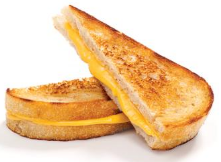
Answer:
Given that,
You want to make 6 cheese sandwiches.
Each sandwich needs 2 slices.
6 × 2 = 12 slices
You have 8 slices of cheese in all. You put 2 slices on each sandwich.
12 – 8 = 4 slices
Therefore you need 4 slices of cheese.
Apply and Grow: Practice
Question 2.
You have 60 fluid ounces of water and 6 water bottles. You pour 8 fluid ounces of water into each bottle. What information do you know that will help you find how much water you have left?
Answer:
Given,
You have 60 fluid ounces of water and 6 water bottles. You pour 8 fluid ounces of water into each bottle.
To find how much water you have left we need to subtract total fluid ounces and amount of fluid ounces in 6 water bottles.
6 × 8 fluid ounces = 48 fluid ounces
60 – 48 = 12 fluid ounces
Thus 12 fluid ounces of water is left.
Question 3.
A sheet of stamps has 2 rows with 5 stamps in each row. You buy 3 sheets of stamps. How many stamps do you buy?
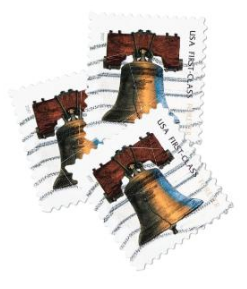
Answer:
Given that,
A sheet of stamps has 2 rows with 5 stamps in each row.
2 × 5 = 10 stamps in each row.
You buy 3 sheets of stamps.
10 × 3 = 30 stamps
Thus you buy 30 stamps.
Question 4.
Your cousin works two jobs. She walks dogs 4 days each week for 2 hours each day. She babysits 2 days each week for 5 hours each day. How many hours does your cousin work in one week?
Answer:
Given that,
Your cousin works two jobs. She walks dogs 4 days each week for 2 hours each day.
4 × 2 = 8 hours each week
She babysits 2 days each week for 5 hours each day.
2 × 5 hours = 10 hours
8 + 10 = 18 hours in one week
Thus your cousin 18 hours in one week.
Question 5.
Four arcade tokens cost $1. You buy $5 in tokens. You play 6 games that cost 3 tokens each. How many tokens do you have left?
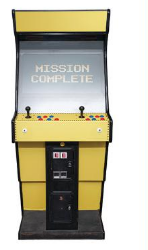
Answer:
Given that,
Four arcade tokens cost $1. You buy $5 in tokens.
1 × 4 = 4 tokens
5 × 4 = 20 tokens
You play 6 games that cost 3 tokens each.
6 × 3 = 18 tokens
20 – 18 tokens = 2 tokens
Thus 2 tokens are leftover.
Think and Grow: Modeling Real Life
A basketball team scores 6 three-pointers, 9 two-pointers, and 7 free throws in the first quarter. How many points does the team score in all?
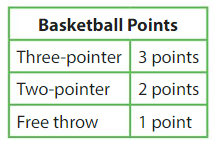
Understand the problem:
Make a plan:
Solve:
The team scores ____ points in all.
Answer:
Given that,
A basketball team scores 6 three-pointers, 9 two-pointers, and 7 free throws in the first quarter.
6 × 3 points = 18 points
9 × 2 points = 18 points
7 × 1 point = 7 point
18 + 18 + 7 = 43 points
Thus the team scores 43 points in all.
Show and Grow
Question 6.
Descartes buys 4 shirts, 3 pairs of shorts, and 2 pairs of pants. How much does he spend in all?
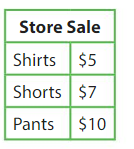
Answer:
Given that,
Descartes buys 4 shirts, 3 pairs of shorts, and 2 pairs of pants.
4 shirts – 4 × $5 = $20
3 shorts – 3 × $7 = $21
2 pants – 2 × $10 = $20
20 + 21 + 20 = $61
Thus Descartes spend $61 in all.
Question 7.
DIG DEEPER!
City workers set up 100 chairs for a concert in a park. Section A has 4 rows with 9 chairs in each row. Section B has 3 rows with 8 chairs in each row. Section C has 8 equal rows. How many chairs are in each of section C’s rows?
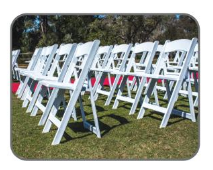
Answer: 40
Explanation:
Given that,
City workers set up 100 chairs for a concert in a park.
Section A has 4 rows with 9 chairs in each row.
4 × 9 = 36 chairs
Section B has 3 rows with 8 chairs in each row.
3 × 8 = 24 chairs
Section C has 8 equal rows.
100 – 36 – 24 = 40 chairs
Thus there are 40 chairs in Section C.
More Problem Solving: Multiplication Homework & Practice 3.9
Question 1.
You and 3 of your friends each spend $9 on a present. How much does the present cost?

Answer: $36
Explanation:
Given,
You and 3 of your friends each spend $9 on a present.
1 – $9
4 – 4 × $9 = $36
Thus the cost of the present is $36.
Question 2.
A landlord is replacing windows in an apartment complex. There are 6 apartments. Each apartment has 8 windows. Seven windows do not need replacing. How many windows does the landlord need to replace?
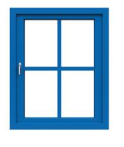
Answer: 41 windows
Explanation:
Given,
A landlord is replacing windows in an apartment complex.
There are 6 apartments. Each apartment has 8 windows.
6 × 8 = 48 windows
Seven windows do not need replacing.
48 – 7 = 41
Therefore the landlord needs to replace 41 windows.
Question 3.
Women’s boxing consists of four 2-minute rounds. There is a 1-minute rest interval between each round. What information do you know that will help you find how long a boxing match lasts?
Answer: I need that information about the time that last four 2-minute rounds and 1-minute rest interval.
Explanation:
Given,
Women’s boxing consists of four 2-minute rounds.
4 × 2 = 8 minutes
There is a 1-minute rest interval between each round.
4 × 1 = 4 minutes
8 + 4 = 12 minutes
Thus the boxing match lasts for 12 minutes.
Question 4.
Writing
Write and solve your own word problem that involves multiplication.
Answer:
Find the product of 3 × 5
We can find the product by using the distributive property.
Rewrite 5 as 2 + 3.
3 × 5 = 3 × (2 + 3)
3 × 5 = (3 × 2) + (3 × 3)
3 × 5 = 6 + 9
3 × 5 = 15
Question 5.
Modeling Real Life
You play a trivia game with your friends. Team A answers 3 hard questions and 6 easy questions. Team B answers 5 hard questions and 2 easy questions. Which team is winning? by how many points?
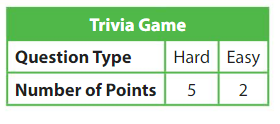
Answer:
Given,
You play a trivia game with your friends. Team A answers 3 hard questions and 6 easy questions.
Hard – 5 points
Easy – 2 points
3 hard question = 3 × 5 = 15 points
6 easy questions = 6 × 2 = 12 points
15 + 12 = 27 points
Team B answers 5 hard questions and 2 easy questions.
5 hard question = 5 × 5 = 25 points
2 easy questions = 2 × 2 = 4 points
25 + 4 = 29 points
Thus Team B is winning the points by 2 points.
Review & Refresh
Question 6.
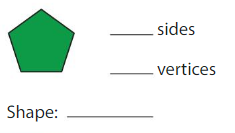
Answer:
i. 5 sides
ii. 5 vertices
iii. pentagon
Explanation:
By seeing the above figure we can say that the shape of the image is a pentagon with 5 sides and 5 vertices.
Question 7.
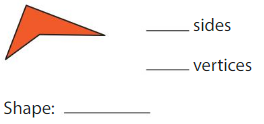
Answer:
i. 4 sides
ii. 4 vertices
iii. Quadrilateral
Explanation:
The figure has 4 sides and 4 vertices so the shape is a quadrilateral.
More Multiplication Facts and Strategies Performance Task
Question 1.
You and your friend make origami animals.
a.You have two packages of paper. One package has 8 colors with 6 sheets of each color. Another package has 3 white sheets and 9 times as many colored sheets as white sheets. How many sheets of paper do you have in all?
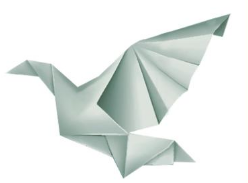
Answer:
Given,
You have two packages of paper. One package has 8 colors with 6 sheets of each color.
8 × 6 = 48 colors in 6 sheets
Another package has 3 white sheets and 9 times as many colored sheets as white sheets.
9 × 3 = 27 sheets
= 27 + 6 = 33 sheets
b.You and your friend each want to make 5 origami animals every day for one week. Do you have enough paper? Explain.
Answer:
Given,
You and your friend each want to make 5 origami animals every day for one week.
5 + 5 = 10 origami animals every day for one week.
10 × 7 = 70 origami animals
Yes, you have enough paper.
c.You make a jumping frog. The first step is to fold the paper into fourths that are shaped like triangles. Draw lines to show how you would fold your paper.
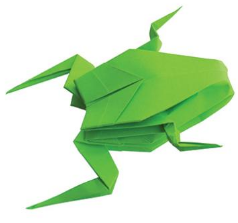
d. It takes 12 steps to make a crane. Your friend makes 8 paper cranes. How many steps does your friend do in all? Explain.
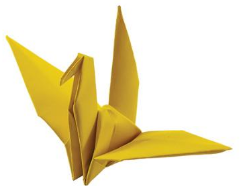
Answer:
Given,
It takes 12 steps to make a crane. Your friend makes 8 paper cranes.
12 × 8 = 96 steps
Your friend does 96 steps in all.
More Multiplication Facts and Strategies Activity
Product Lineup
Directions:
1. Players take turns flipping two number cards.
2. On your turn, multiply the two numbers and place a counter on the product.
3. If you flip two of the same number, take another turn.
4. The first player to create two lines of 5 in a row, horizontally, vertically, or diagonally, wins!
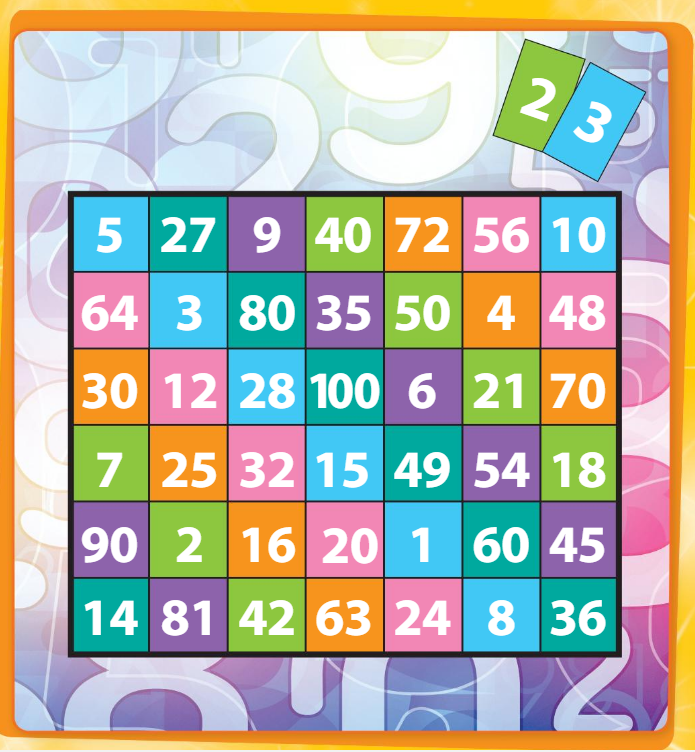
Answer:
Multiply 5 by row, horizontally and vertically.
5 × 27 = 135
5 × 64 = 320
5 × 3 = 15
More Multiplication Facts and Strategies Chapter Practice
3.1 Multiply by 3
Draw the model to find the product
Question 1.
3 × 8
Answer:
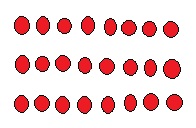
Question 2.
3 × 4
Answer:
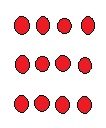
Find the product
Question 3.

Answer: 15
Explanation:
Multiply the two numbers 3 and 5.
3 × 5 = 15
Question 4.

Answer: 0
Explanation:
Multiply the two numbers 0 and 3.
Any number multiplied by 0 will be always 0.
So, 0 × 3 = 0
Question 5.

Answer: 3
Explanation:
Multiply the two numbers 1 and 3.
Any number multiplied by 1 will be always the same number.
1 × 3 = 3
Question 6.

Answer: 18
Explanation:
Multiply the two numbers 3 and 6.
3 × 6 = 18
3.2 Multiply by 4
Find the product
Question 7.

Answer: 32
Explanation:
Multiply the two numbers 4 and 8.
4 × 8 = 32
Question 8.

Answer: 40
Explanation:
Multiply the two numbers 10 and 4.
10 × 4 = 40
Question 9.

Answer: 28
Explanation:
Multiply the two numbers 7 and 4.
7 × 4 = 28
Question 10.

Answer: 16
Explanation:
Multiply the two numbers 4 and 4.
4 × 4 = 16
Find the missing factor
Question 11.
1 × ___ = 4
Answer: 4
Explanation:
Let the missing factor be a.
1 × a = 4
a = 4/1
a = 4
Thus the missing factor is 4.
Question 12.
____ × 4 = 0
Answer: 0
Explanation:
Let the missing factor be b.
b × 4 = 0
b = 0/4
b = 0
Thus the missing factor is 0.
Question 13.
20 = ____ × 4
Answer: 5
Explanation:
Let the missing factor be c.
20 = c × 4
c = 20/4
c = 5
Thus the missing factor is 5.
Question 14.
Number Sense
How can you use 2 × 5 to find 4 × 5?
Answer:
Rewrite 4 as 2 + 2.
4 × 5 = (2 + 2) × 5
4 × 5 = (2 × 5) + (2 × 5)
4 × 5 = 10 + 10
4 × 5 = 20
3.3 Multiply by 6
Find the product
Question 15.

Answer: 30
Explanation:
Multiply the two numbers 6 and 5.
6 × 5 = 30
Question 16.

Answer: 12
Explanation:
Multiply the two numbers 6 and 2.
6 × 2 = 12
Question 17.

Answer: 54
Explanation:
Multiply the two numbers 9 and 6.
9 × 6 = 54
Question 18

Answer: 18
Explanation:
Multiply the two numbers 3 and 6.
3 × 6 = 18
Compare
Question 19.
![]()
Answer: <
Explanation:
Compare both expressions
7 × 6 = 42
6 × 8 = 48
42 is less than 48.
7 × 6 < 6 × 8
Question 20.
![]()
Answer: >
Explanation:
Compare both expressions
6 × 9 = 54
4 × 6 = 24
54 is greater than 24.
6 × 9 > 4 × 6
Question 21.
![]()
Answer: =
Explanation:
Compare both expressions
6 × 6 = 36
36 = 6 × 6
3.4 Multiply by 7
Find the product
Question 22.

Answer: 0
Explanation:
Multiply the two numbers 0 and 7.
Any number multiplied by 0 is always 0.
0 × 7 = 0
Question 23.

Answer: 49
Explanation:
Multiply the two numbers 7 and 7.
7 × 7 = 49
Question 24.

Answer: 70
Explanation:
Multiply the two numbers 10 and 7.
10 × 7 = 70
Question 25.

Answer: 14
Explanation:
Multiply the two numbers 7 and 2.
7 × 2 = 14
Question 26.

Answer: 7
Explanation:
Multiply the two numbers 7 and 1.
Any number multiplied by 1 is always the same number.
7 × 1 = 7
Question 27.

Answer: 63
Explanation:
Multiply the two numbers 7 and 9.
7 × 9 = 63
Question 28.

Answer: 28
Explanation:
Multiply the two numbers 4 and 7.
4 × 7 = 28
Question 29.

Answer: 56
Explanation:
Multiply the two numbers 8 and 7.
8 × 7 = 56
3.5 Multiply by 8
Find the product
Question 30.

Answer: 48
Explanation:
Multiply the two numbers 8 and 6.
8 × 6 = 48
Question 31.
![]()
Answer: 72
Explanation:
Multiply the two numbers 9 and 8.
9 × 8 = 72
Question 32.

Answer: 32
Explanation:
Multiply the two numbers 4 and 8.
4 × 8 = 32
Question 33.

Answer: 40
Explanation:
Multiply the two numbers 8 and 5.
8 × 5 = 40
Question 34.
Precision
There are 8 fluid ounces in 1 cup. How many fluid ounces are in 3 cups?
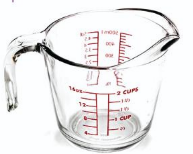
Answer: 24 fluid ounces
Explanation:
Given,
There are 8 fluid ounces in 1 cup.
1 cup – 8 fluid ounces
3 cups – 3 × 8 fluid ounces = 24 fluid ounces
Therefore there are 24 fluid ounces in 3 cups.
3.6 Multiply by 9
Find the product
Question 35.

Answer: 90
Explanation:
Multiply the two numbers 10 and 9.
10 × 9 = 90
Question 36.

Answer: 36
Explanation:
Multiply the two numbers 9 and 4.
9 × 4 = 36
Question 37.

Answer: 54
Explanation:
Multiply the two numbers 9 and 6.
9 × 6 = 54
Question 38.

Answer: 18
Explanation:
Multiply the two numbers 3 and 6.
3 × 6 = 18
Thus the product of 3 and 6 is 18.
Question 39.
Reasoning
An artist needs 80 flower petals for a craft. She picks 9 flowers that each have 8 petals. Does she have enough flower petals for her craft? Explain.

Answer:
Given,
An artist needs 80 flower petals for a craft.
She picks 9 flowers that each have 8 petals.
9 × 8 = 72 flower petals.
80 – 72 = 8 flower petals
Therefore, She has enough flower petals for her craft.
3.7 Practice Multiplication Strategies
Use any strategy to find the product
Question 40.
2 × 7 = ____
Answer: 14
Explanation:
We can find the product by using the distributive property.
Rewrite 7 as 5 + 2.
2 × 7 = 2 × (5 + 2)
2 × 7 = (2 × 5) + (2 × 2)
2 × 7 = 10 + 4
So, 2 × 7 = 14
Question 41.
6 × 6 = ____
Answer: 36
Explanation:
We can find the product by using the distributive property.
Rewrite 6 as 3 + 3
6 × 6 = 6 × (3 + 3)
6 × 6 = (6 × 3) + (6 × 3)
6 × 6 = 18 + 18
Thus 6 × 6 = 36
Question 42.
5 × 1 = _____
Answer: 5
Explanation:
We can find the product by using the distributive property.
Rewrite 5 as 2 + 3
5 × 1 = (2 + 3) × 1
5 × 1 = (2 × 1) + (3 × 1)
5 × 1 = 2 + 3
Thus 5 × 1 = 5
Question 43.
8 × 10 = ____
Answer: 80
Explanation:
We can find the product by using the distributive property.
Rewrite 10 as 5 + 5
8 × 10 = 8 × (5 + 5)
8 × 10 = (8 ×5) + (8 × 5)
8 × 10 = 40 + 40
So, 8 × 10 = 80
Question 44.
4 × 0 = ____
Answer: 0
Explanation:
We can find the product by using the distributive property.
Any number multiplied by 0 will be always 0.
So, 4 × 0 = 0
Question 45.
10 × 10 = ____
Answer: 100
Explanation:
We can find the product by using the distributive property.
Rewrite 10 as 5 + 5
10 × 10 = 10 × (5 + 5)
10 × 10 = (10 ×5) + (10 × 5)
10 × 10 = 50 + 50
Thus 10 × 10 = 100
Question 46.
Modeling Real Life
Newton has 4 bundles of balloons. There is 1 blue balloon, 2 purple balloons, and 1 green balloon in each bundle. How many balloons does he have in all?

Answer: 16 balloons
Explanation:
Given that,
Newton has 4 bundles of balloons.
There is 1 blue balloon, 2 purple balloons, and 1 green balloon in each bundle.
4 bundles = 1 blue balloon × 4 + 2 purple balloons × 4 + 1 green balloon × 4
= 4 blue ballon + 8 purple balloon + 4 green balloon
= 16 balloons
Thus there are 16 balloons in all.
3.8 Multiply Three Factors
Find the product
Question 47.
(4 × 2) × 2 = _____
Answer: 16
Explanation:
Given the expression as (4 × 2) × 2
First, multiply the factors in the bracket.
4 × 2 = 8
8 × 2 = 16
Thus (4 × 2) × 2 = 16
Question 48.
3 × (3 × 3) = ____
Answer: 27
Explanation:
Given the expression as 3 × (3 × 3)
First, multiply the factors in the bracket.
3 × 3 = 9
3 × 9 = 27
Thus 3 × (3 × 3) = 27
Question 49.
(3 × 3) × 6 = ____
Answer: 54
Explanation:
Given the expression as (3 × 3) × 6
First, multiply the factors in the bracket.
3 × 3 = 9
9 × 6 = 54
Thus (3 × 3) × 6 = 54
Question 50.
2 × (8 × 4) = _____
Answer: 64
Explanation:
Given the expression as 2 × (8 × 4)
First, multiply the factors in the bracket.
8 × 4 =32
2 × 32 = 64
Thus 2 × (8 × 4) = 64
Question 51.
(2 × 0) × 4 = _____
Answer: 0
Explanation:
Given the expression as (2 × 0) × 4
First, multiply the factors in the bracket.
2 × 0 = 0
0 × 4 = 0
Thus (2 × 0) × 4 = 0
Question 52.
0 × (8 × 5) = ____
Answer: 0
Explanation:
Given the expression as 0 × (8 × 5)
First, multiply the factors in the bracket.
8 × 5 = 40
0 × 40 = 0
Thus 0 × (8 × 5) = 0
3.9 More Problem Solving: Multiplication
Question 53.
You find 2 four-leaf clovers and 9 three-leaf clovers. What is the total number of leaves on the clovers you find?
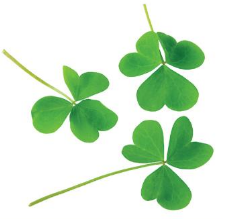
Answer:
Given that,
You find 2 four-leaf clovers and 9 three-leaf clovers
2 four-leaf clovers = 4 + 4 = 8 leaves
9 three-leaf clovers = 3 + 3 + 3 + 3 + 3 + 3 + 3 + 3 + 3 =27 leaves
8 + 27 = 35
Thus the total number of leaves on the cloves are 35.
Question 54.
A bakery sells croissants for $2 each. A tray contains 2 rows of 4 croissants. You buy 2 trays. How many croissants do you buy?
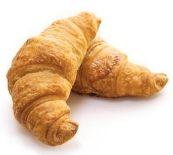
Answer: 16 croissants
Explanation:
Given that,
A bakery sells croissants for $2 each.
A tray contains 2 rows of 4 croissants.
2 × 4 = 8
You buy 2 trays.
8 × 2 = 16 croissants
Cost of croissants = 16 × $2 = $32
Thus I can buy 16 croissants.
Final Words:
I hope the solutions provided in Big Ideas Math Answers Grade 3 Chapter 3 More Multiplication Facts and Strategies are beneficial for all the students to overcome the difficulties. If you have any quieries regarding the topics grade 3 students can post the comments in the below comment section. Stay with us to get the solutions for all 3rd Std Bigideas Math Answers for all the chapters.